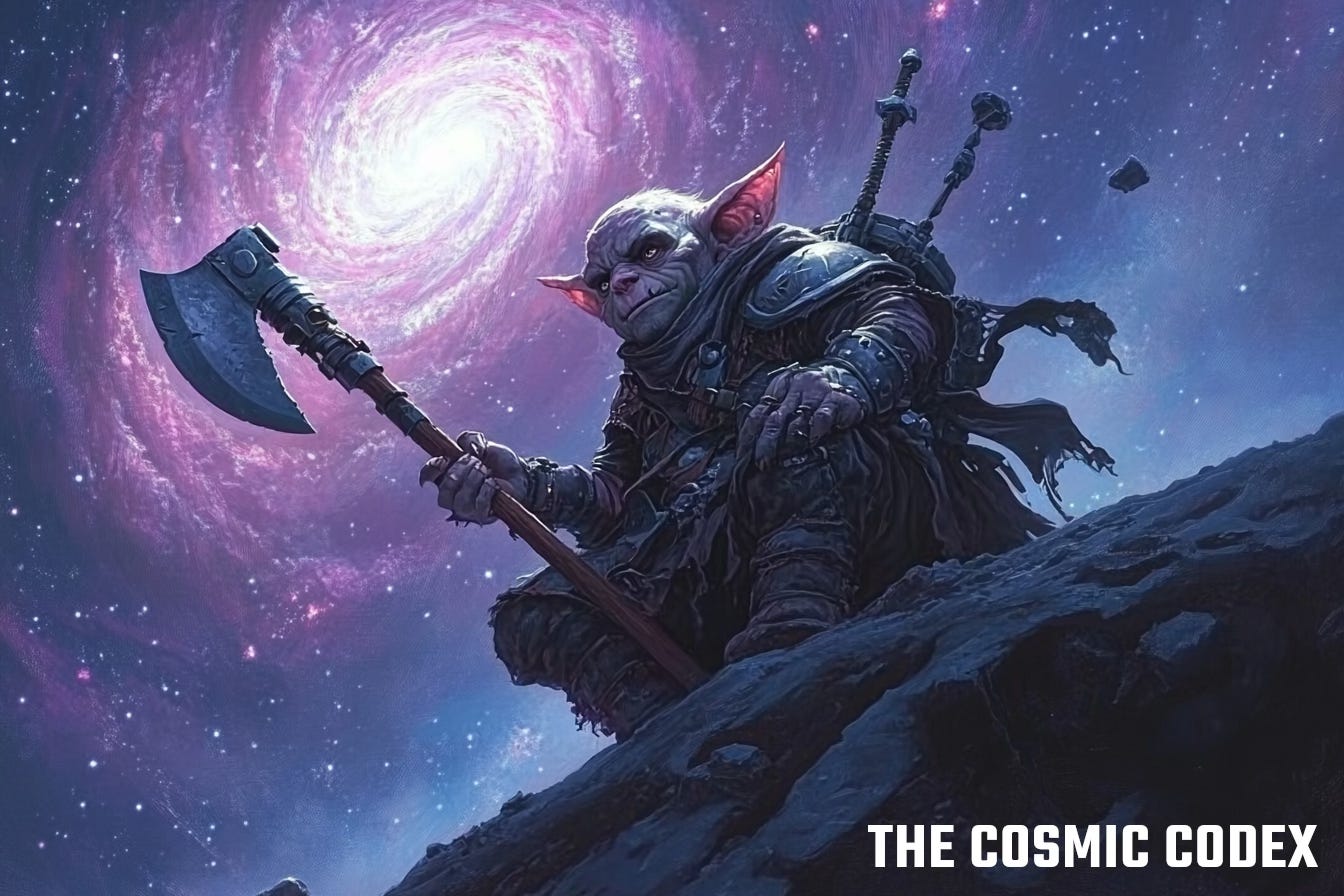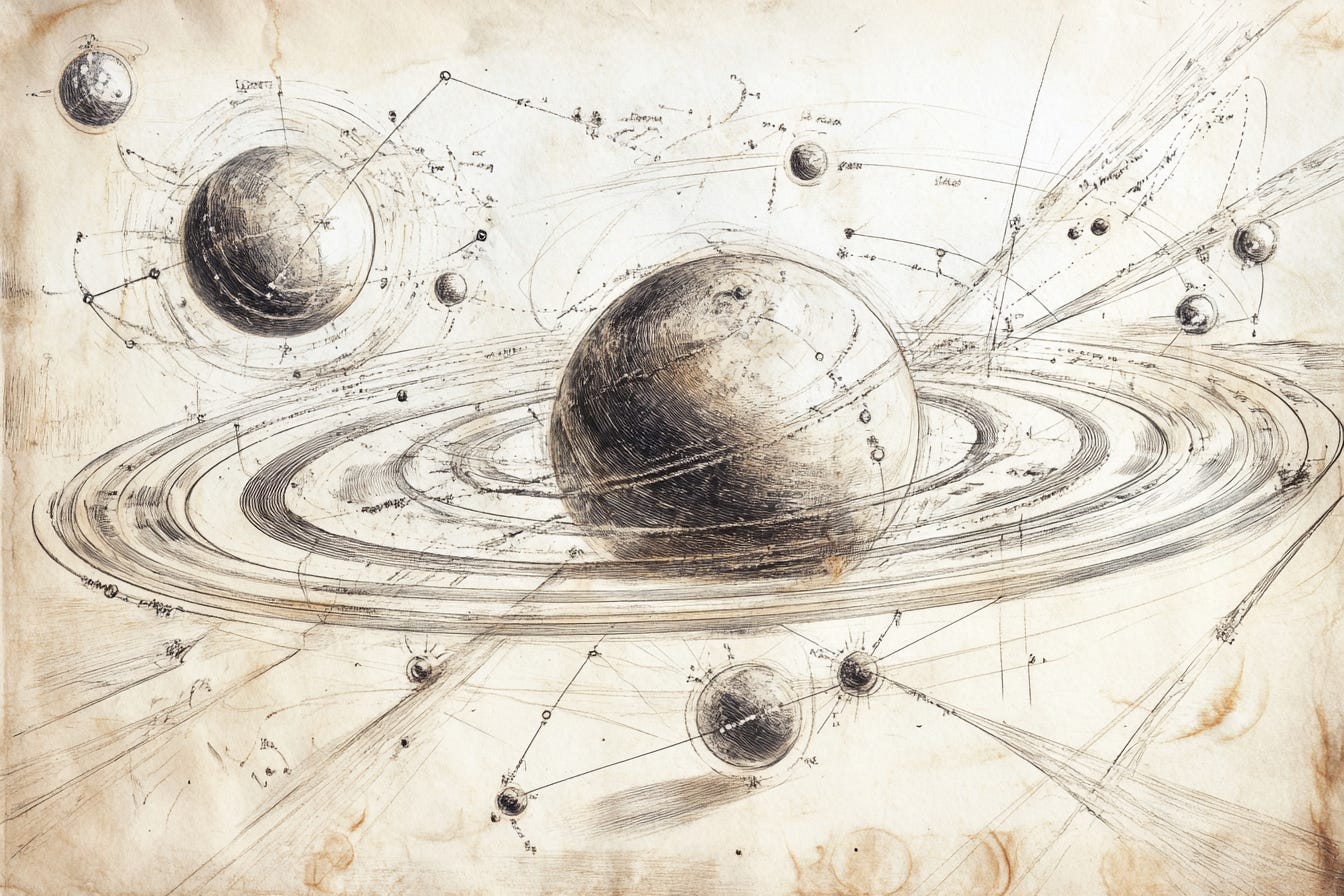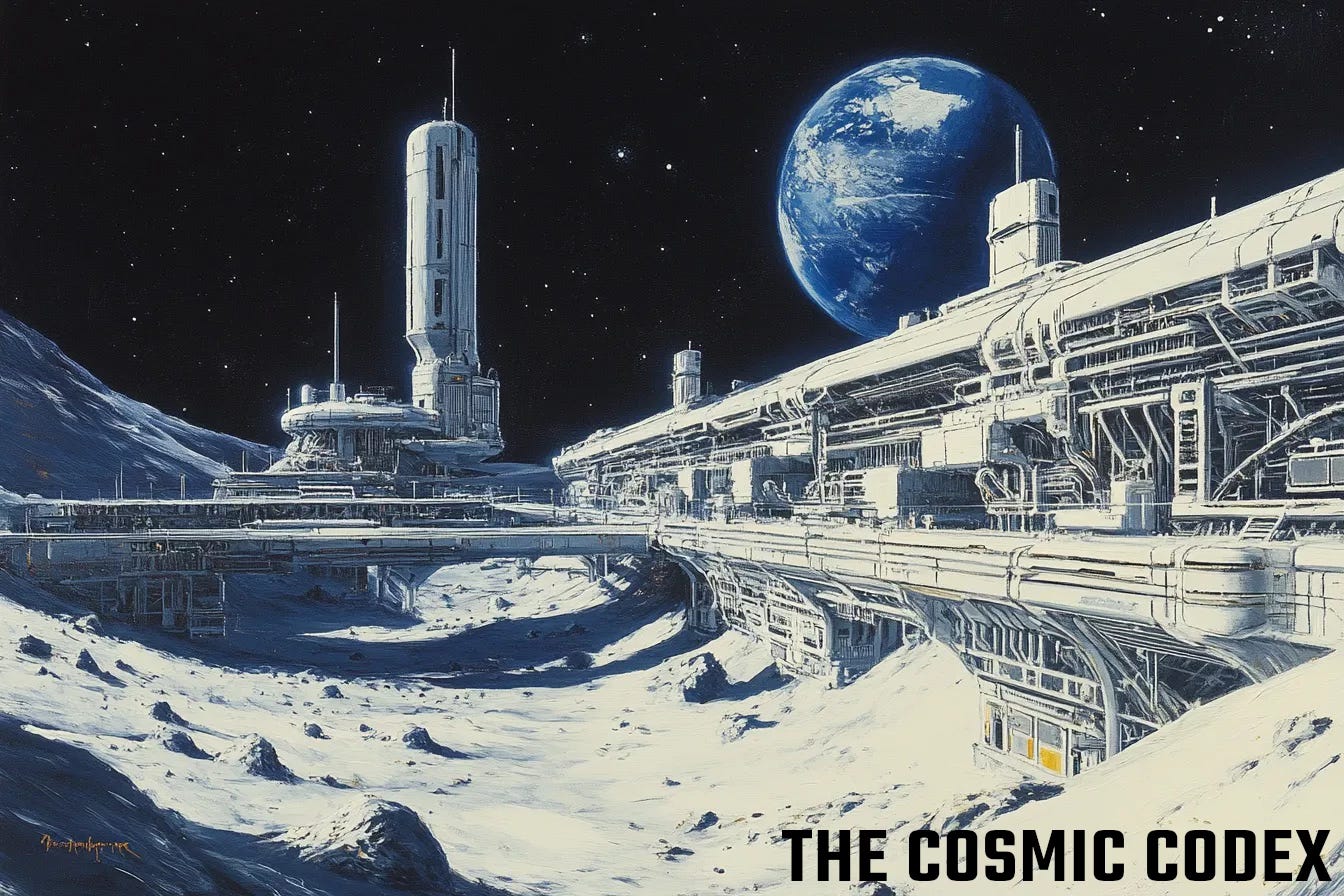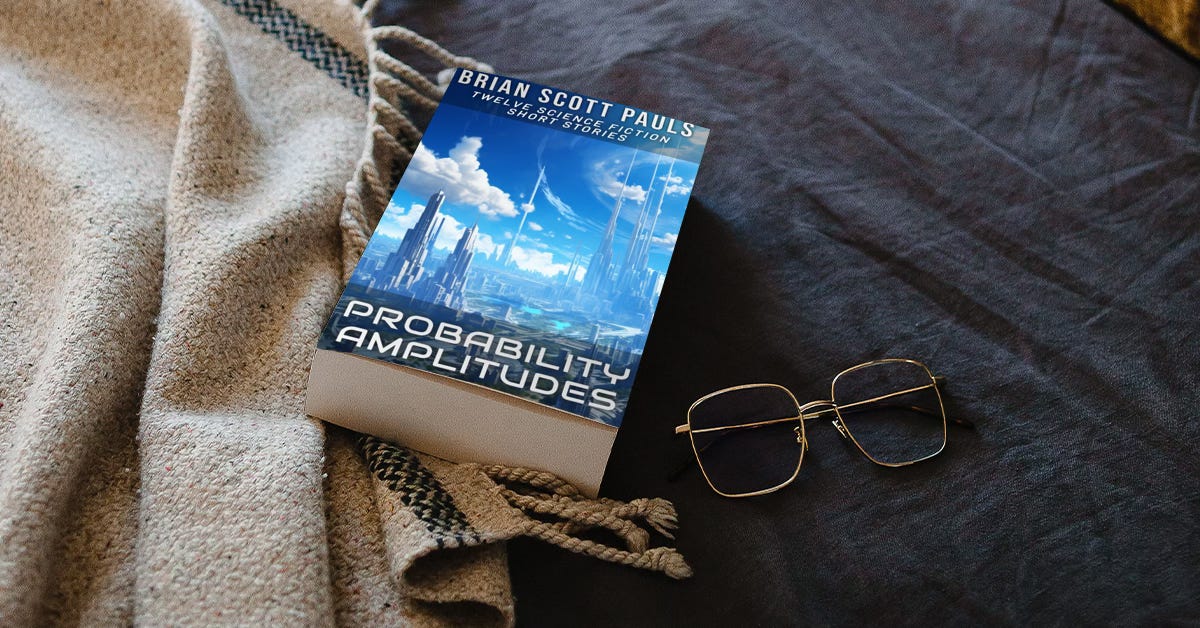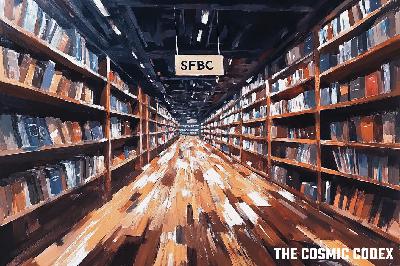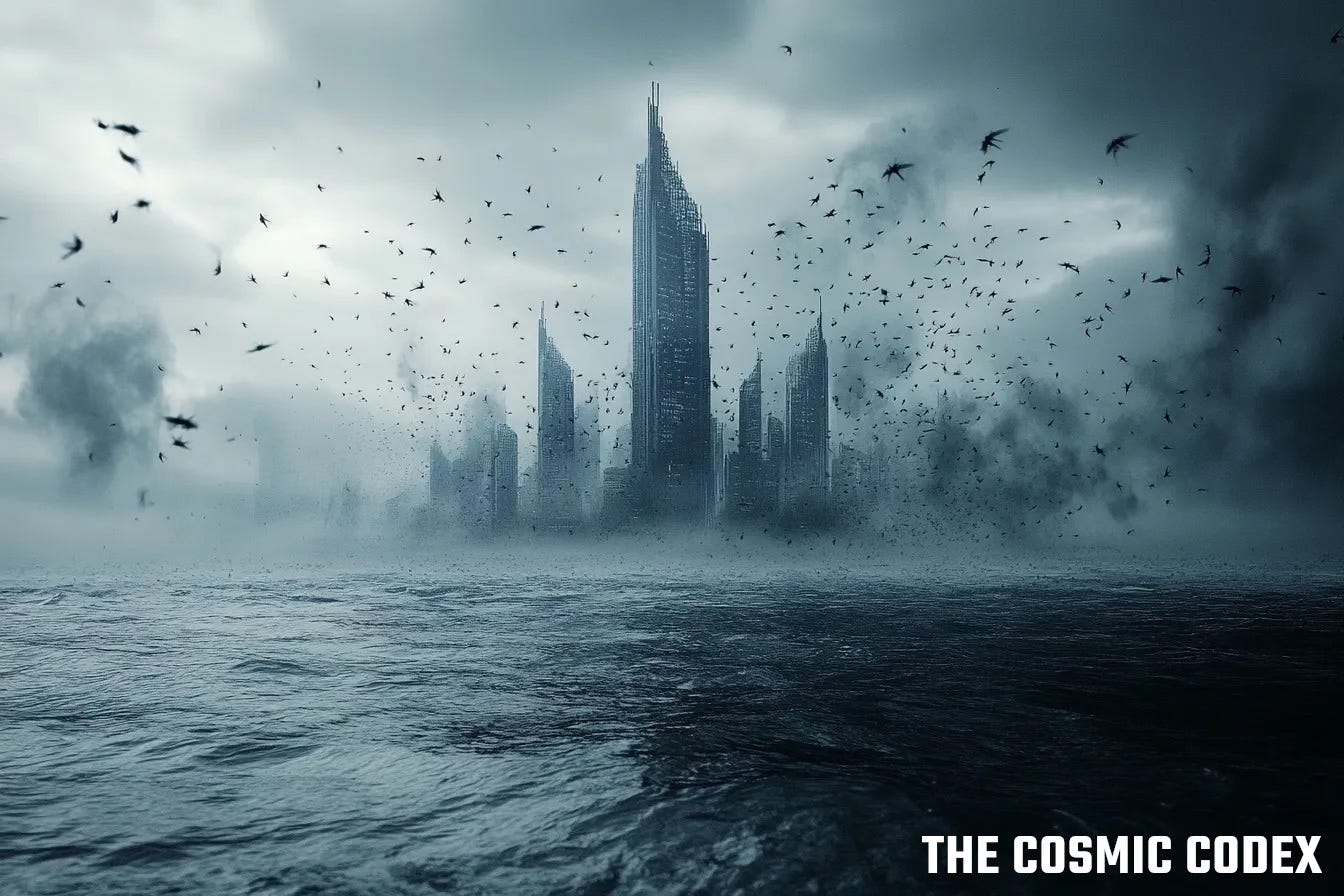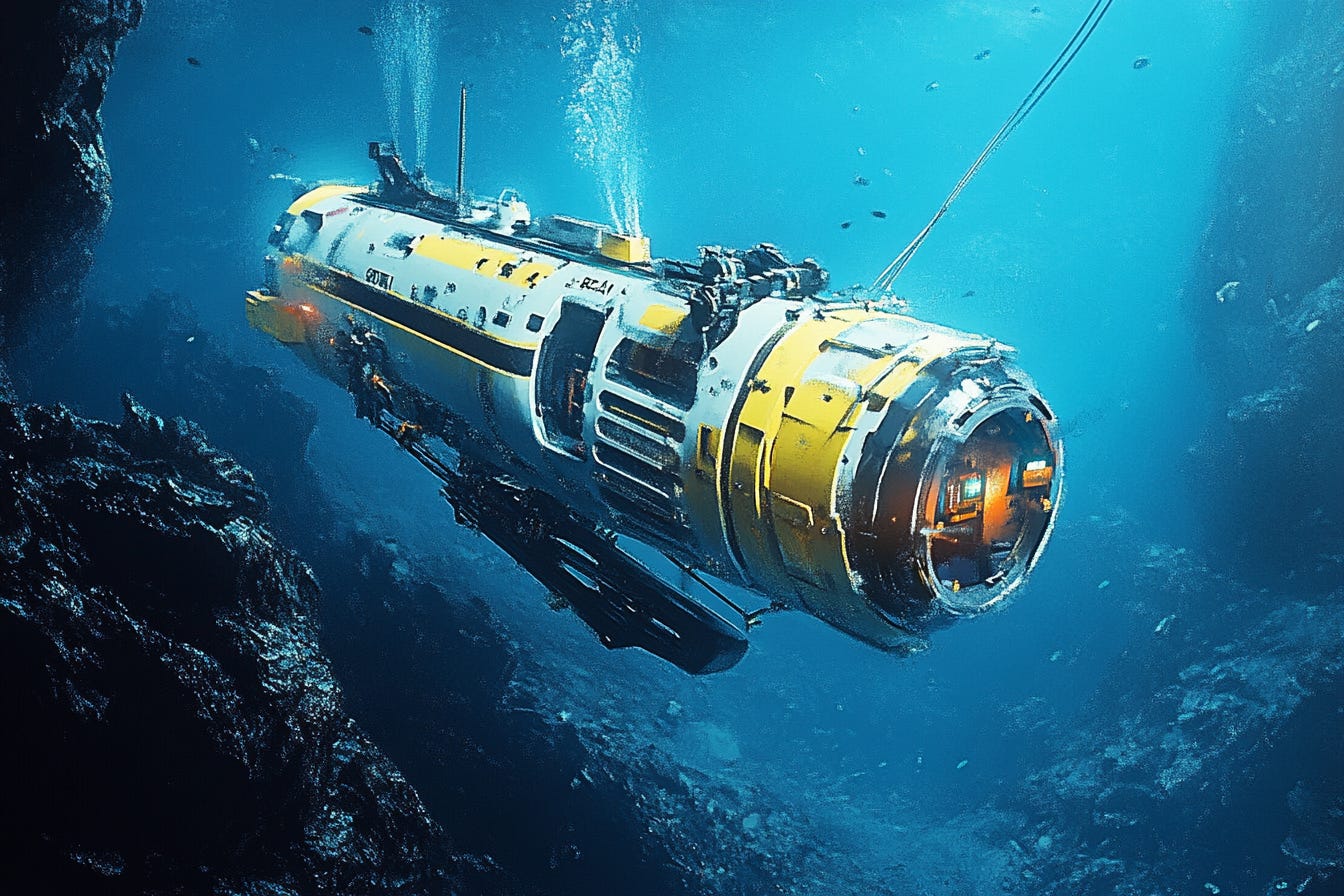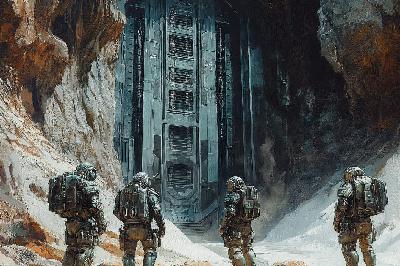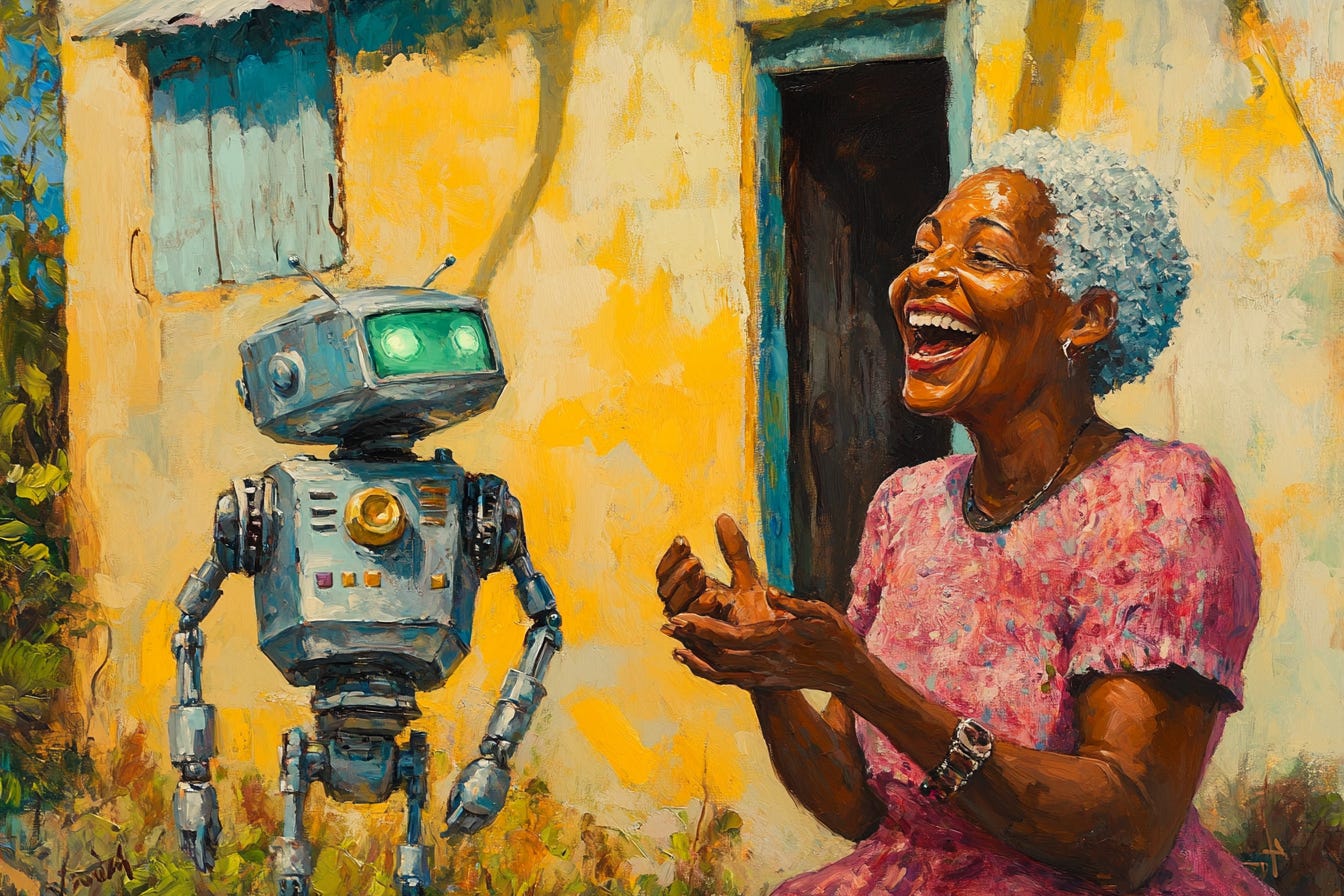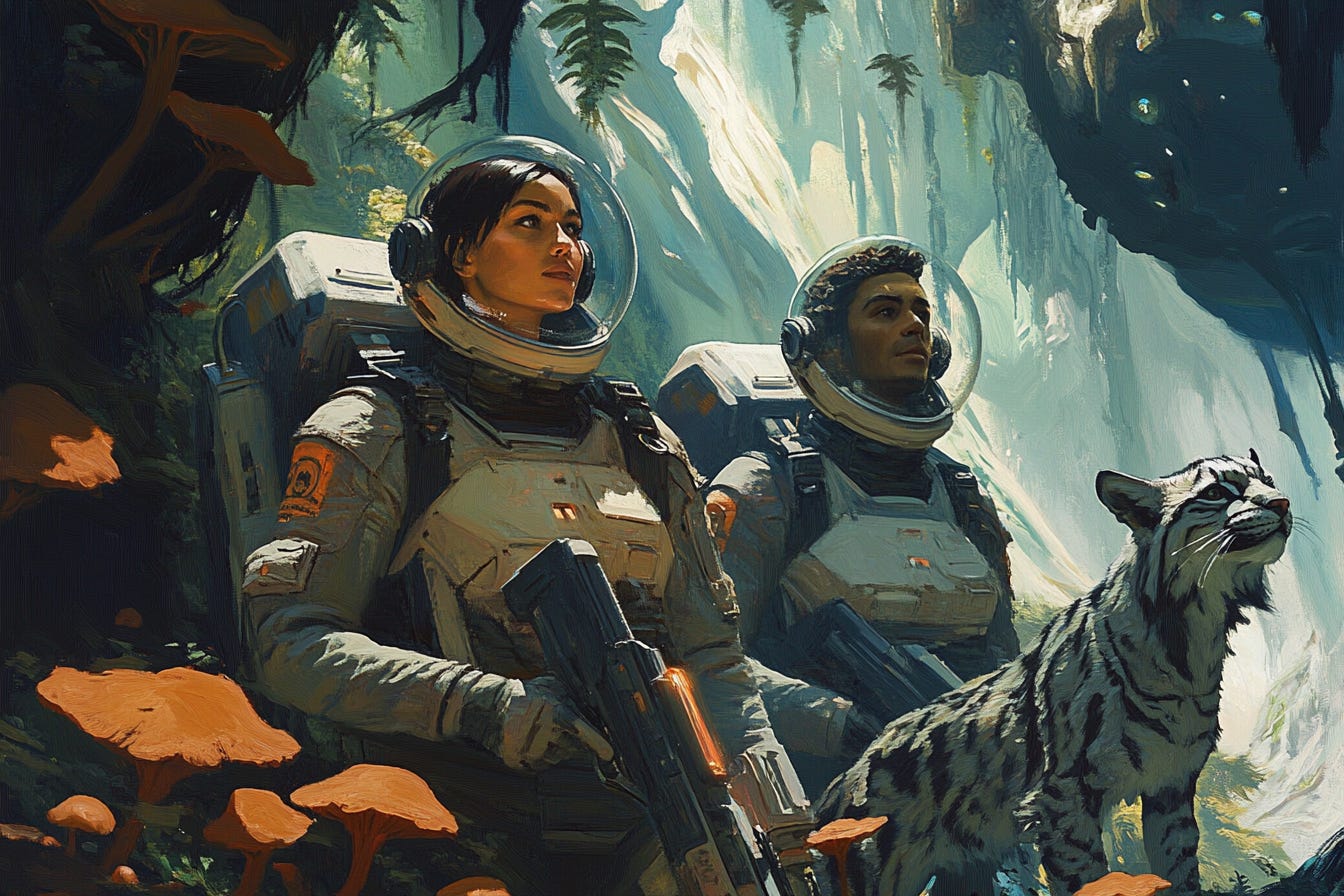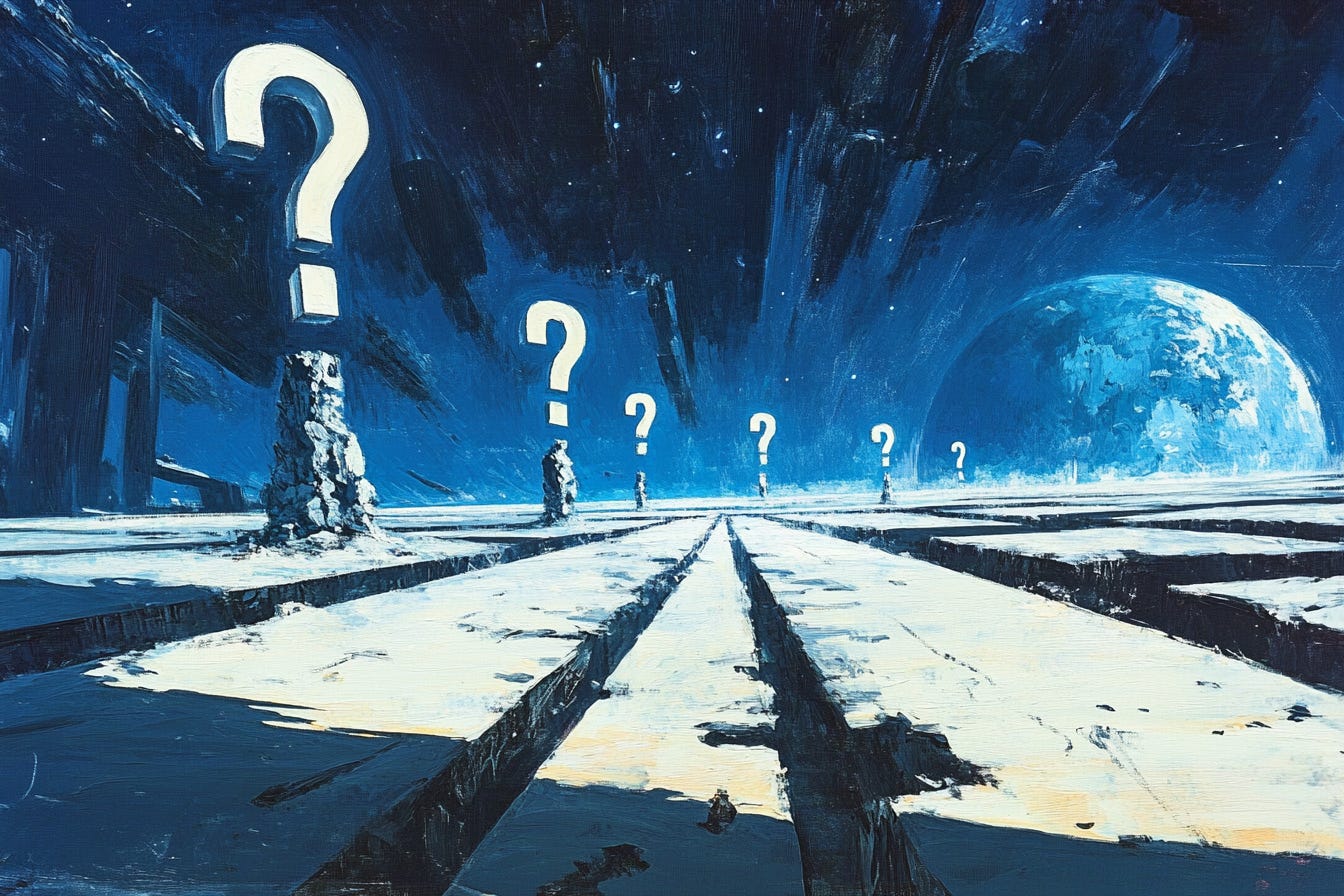Discover The Cosmic Codex
The Cosmic Codex

The Cosmic Codex
Author: Brian Scott Pauls
Subscribed: 0Played: 5Subscribe
Share
© Brian Scott Pauls
Description
95 Episodes
Reverse
My novelette, An Illicit Mercy, is part of a new promotion in May: FREE Sci-fi & Fantasy.Over 165 stories, novels, samples and excerpts, available at no cost.A heroic, humorous, and inspirational space opera!Get your FREE copy of Showdown at Jupiter's Edge: A Maxo Magnaveer Adventure by Daniel P. Douglas.Space cop Maxo Magnaveer, desperate for a major career boost, takes a wild left turn at Mercury to pursue a greedy pirate, setting himself onto a collision course with destiny!In the year 2247, Detectant Maxo Magnaveer yearns for an opportunity to prove himself in the Cosmic Law Force so he can be promoted to squad captain. When a greedy privateer, Colonel Zaza D'Rump, brazenly hijacks a shipment of synthetic foods on its way to Mars with plans to starve the colony to death unless he is given control of Earth's shipping lanes, Maxo sees his opportunity to rise above, save the day, and finally move up in rank and prestige.Fooled by those he thought were allies, Maxo stumbles on the slippery edge of failure more than once as he races to what could be a catastrophic battle above Jupiter near D'Rump's secret base, Porto Blago. With his career and so many lives at stake, Maxo gains the help of old and new friends, and begins to realize his quest may not be about proving himself to anyone, but about discovering himself and rising to his true purpose in the universe.First, however, he'll have to survive the showdown at Jupiter's edge...by Brian Scott PaulsThis article introduces what I hope will be the first of many interviews with those who work in the science fiction field, and perhaps readers as well.My inaugural guest is Charles Tyra, Publisher at Randolph Literary Press, which currently publishes Cosmic Horror Monthly, and will soon publish a new magazine, Goblins & Galaxies.Click below to watch the interview, or continue reading for a transcript of our conversation I’ve edited for clarity and readability.Brian Scott Pauls: You’ve described Cosmic Horror Monthly as a love letter to Weird Tales, one of the original fantastical pulp magazines. How do you define “weird fiction?” Newer readers who aren't steeped in the pulps may not know what that means and how to differentiate other types of science fiction and fantasy from weird fiction.Thanks for reading The Cosmic Codex! Subscribe for free to receive new posts and support my work.Charles Tyra: With CHM, it did kind of start out as trying to pay tribute and homage to a magazine I loved growing up. And when it comes to weird fiction, you could probably ask ten publishers or editors, and they might all have a different answer. But for me, it's kind of like taking one of the sub genres like horror or science fiction or fantasy, and then you have something that's off with the world. And it's specifically unexplained. We just experience this distortion through the mind and the eyes of the main character.Brian: The triad of weird fiction authors, to me at least, seems to be the “acronyms”: H.P. Lovecraft, Clark Ashton Smith, and Robert E. Howard. All three wrote—in addition to fantasy and horror—science fiction. Do you find in weird fiction a blending of genres that tend to be more distinct when they don't carry that label?Charles: That's a good observation. They can be blended in all different ways as well as standing alone. And those three writers like had their own distinct style with doing that.Clark Ashton Smith took weird fiction in the direction of fantasy, Lovecraft in the direction of cosmic horror, and Robert E. Howard in the direction of sword and sorcery.Brian: Clark Ashton Smith has a small segment of his bibliography that is science fiction. But what do you think characterizes Clark Ashton Smith as a science fiction writer compared more modern writers?Charles: That's a writer that I really enjoy, but I haven't read [all] his works, compared to like Lovecraft. So how he differentiates in terms of science fiction is hard to say.Brian: Why don't you take the same question with Lovecraft? What makes a Lovecraft science fiction story different from an Isaac Asimov science fiction story?Thanks for reading The Cosmic Codex! This post is public so feel free to share it.Charles: The real difference is the science fiction is not really at the forefront. It's definitely there. You have characters that are scientists and that are trying to discover things. And rather than being enlightened, like a lot of characters in Asimov stories, they find something, and they're horrified, and their lives changed forever in a bad way.Brian: Do you have a favorite weird fiction science fiction story?Charles: It's gonna kind of depend on what era we're talking about. One of my favorites that combines weird fiction and science fiction is “The Diamond Lens”, by Fitz-James O'Brien. That's a super old one.Brian: But it's very good. James Gunn put it in one of his collections in The Road to Science Fiction. He called it a good candidate for the first modern science fiction story. In the 1860s, I think, pre-Civil War.Charles: Unfortunately, we didn't get more writing from him because of the Civil War.Brian: There are a lot of science fiction writers where we could have enjoyed a lot more from them. But life got cut short, or got in the way.Tell me about Goblins & Galaxies. You already have a successful magazine, Cosmic Horror Monthly. And you decided to start Goblins & Galaxies. It's going to combine three different sub genres.Charles: It's going back to my my same love. For the older pulp magazines, Weird Tales was foundational for cosmic horror and sword and sorcery (about a hundred years ago.) This is me doing the same thing, applying the same treatment we did with CHM, to this other genre that I really love. But asking to take that pretty niche subgenre in new directions. Hopefully we can see it combined with dark fantasy, and also see sword and sorcery combined with science fiction. There are some rules with sword and sorcery, but I think the setting, while awesome when it's a high fantasy, medieval setting, I don't think that should be a hard rule.Brian: The 1970s was a heyday of sword and sorcery, but a lot of writers in the 60s and 70s—I'm thinking here, in particular, of Michael Moorcock—had no compunction about combining science and magic in a sword and sorcery tale. It gives those stories a feel, a vibe, that you don't get from a lot of modern fantasy.If Cosmic Horror Monthly is reminiscent of Weird Tales, do you see Goblins & Galaxies as something in the same vein as The Magazine of Fantasy and Science Fiction?Charles: I definitely hope to draw some inspiration there.Brian: What kind of stories are you hoping to get? Are you already taking submissions?Charles: The Kickstarter is still going for another week. On May 7th we'll open submissions for the first time.Brian: On another interview you said--perhaps surprisingly, because this is not always the case with editors--you enjoy reading the slush pile. Do you read everything that gets submitted for one of your magazines?Charles: Early on I definitely did read everything, but as time wore on and the responsibilities increased, I wasn't able to continue doing that. I still read as much as possible. That's one of the things I haven't grown tired of. Reading new stuff is just so exciting to me. I don't read every manuscript, but I try to read as much as possible—usually like half of the pile.Brian: What kind of range do you see? Just in terms of writing ability for people that submit a magazine.Charles: I think that it ebbs and flows with each open call. At this point I'm taking submissions four times a year, and our last couple of open calls the writing was really strong.Brian: That's awesome. With platforms like Wattpad, for instance, I feel there's a real desire out there for people to write and be able to send it somewhere and get somebody to look at it. [It’s] encouraging that people are sending in to your magazines.Well known science fiction editor, John W. Campbell, Jr., if he saw a story he wasn't going to accept, but he saw a spark of promise in the writer, he would write them back—sometimes voluminous feedback, “Here's all the things wrong with your story. You should fix these on your next story.” Do you do anything like that?Charles: We try to respond to every one we can. Unfortunately, we're not able to respond to all the manuscripts that come in. But if we have a story, it’s solid, it's promising, it was enjoy[able] to read, but it's not quite there…We're talking about maybe thirty-five spots out of a slush pile that's got 700 manuscripts in it. So a lot of great stories maybe don't make it. We try to respond to those as well as we can.Brian: A lot of new writers, in particular, would find it encouraging to know you do some of that. It can be demoralizing when you're sending in your manuscript—even though you no longer have to type it out, put it in an envelope, send it off. But even when you log into the portal and upload it, it's kind of like, “Am I ever gonna hear anything other than, hey—no, thanks.” I'm sure some people will take encouragement from [knowing] there's a better-than-zero chance [you’ll] respond.You mentioned Kickstarter. Did you learn anything from your launch of Cosmic Horror Monthly that informed what you did with the launch of Goblins & Galaxies?Charles: Oh, endless lessons. I have been doing Cosmic Horror Monthly for about five years, and I just jumped into that project, not knowing a whole lot about the specific processes and what all goes into it. I've built what I do as I go, and whenever we learn about something that works, now that's the thing that we do. So there's a lot of things I won't have to learn a second time. I'm excited about hitting the ground running with this magazine.Brian: Does [Cosmic Horror Monthly] run advertising in addition to selling subscriptions?Charles: I decided early on that the subscription magazine you receive as a paying reader will not have advertisements in i
My novelette, An Illicit Mercy, is part of a new promotion in April: FREE Adventures in Sci-fi & Fantasy.Over 150 stories, novels, samples and excerpts, available at no cost.My latest novelette, “Fire From Heaven,” now appears in Boundary Shock Quarterly 29: First Contact.In the shadows of an alien world, terror awaits. On the radiation-blasted planet Janus, a team of explorers descends into Abbadon—an ancient mountain facility hiding unimaginable secrets. As they navigate bizarre chambers filled with cryptic carvings, they unleash a nightmare. But the true horror lies not in the alien ruins, but in the chilling implications of the team’s discovery.Fire From Heaven is the sequel to my previous novelette, “Nasty, Brutish, and Short.”by Brian Scott PaulsWriting a book, I’m finding, is all about getting the words out.I’m grateful I continue making headway on Probability Amplitudes, my first collection of science fiction short stories. Since I last reported my progress in February, I’ve edged ahead from 43% in the “New Material Required” category, to 42%. While this represents only about 1600 of my 160,000 word goal for the pre-edited manuscript, they are 1600 words in the right direction. Like the tortoise who keeps moving, I’ll get there sooner or later.Thanks for reading The Cosmic Codex! Subscribe for free to receive new posts and support my work.In the meantime, I’m pleased to add the title of a new prospective story to the list I revealed last month.“Guan Tayen and the Spirit of Quantum Chaos”As the youngest member of a free trader’s crew, fifteen-year-old Tayen feels like the rest of her family doesn’t take her seriously. Her elder sister and brother treat her like she’s in the way, her dad doesn’t have time for her, and her mom thinks all she can do is take care of her baby brother. If only she had some way to prove she’s a grown-up, just as valuable as anyone else on the ship.Thanks for reading The Cosmic Codex! This post is public so feel free to share it.Disaster strikes when a mysterious influence wreaks havoc on the quantum network linking the worlds and vessels of Tayen’s star system. As ships go offline and governments teeter on the edge of collapse, can she succeed where everyone else has failed? Can she draw on the inspiration of her Objibwe and Chinese heritage to confront and defeat the destructive presence threatening to destroy them all?This feels like it will be a fun story to write. I’m excited to see how it turns out!New Material Required: 67,463 wordsFirst Draft: 85,123 wordsFinal Draft: 7414 wordsTOTAL: 160,000Questions about Probability Amplitudes? Please comment below! This is a public episode. If you would like to discuss this with other subscribers or get access to bonus episodes, visit www.thecosmiccodex.com
My novelette, An Illicit Mercy, is part of a new promotion in April: FREE Adventures in Sci-fi & Fantasy.Over 150 stories, novels, samples and excerpts, available at no cost.My latest novelette, “Fire From Heaven,” now appears in Boundary Shock Quarterly 29: First Contact.In the shadows of an alien world, terror awaits. On the radiation-blasted planet Janus, a team of explorers descends into Abbadon—an ancient mountain facility hiding unimaginable secrets. As they navigate bizarre chambers filled with cryptic carvings, they unleash a nightmare. But the true horror lies not in the alien ruins, but in the chilling implications of the team’s discovery.Fire From Heaven is the sequel to my previous novelette, “Nasty, Brutish, and Short.”In a timely decision, the Audible Original version of George Orwell’s 1984, adapted by Joe White, has won the Audie Award for Audio Drama.White possesses multiple stage credits, and previously wrote The Nox, a cli-fi audio drama also published by Audible.Thanks for reading The Cosmic Codex! Subscribe for free to receive new posts and support my work.Released last year, White’s adaptation of 1984 features a cast studded with voices listeners will recognize, including Andrew Garfield and Tom Hardy, as well as Emmy, Grammy, and Tony award-winning Cynthia Erivo. It holds the distinction of “…the most downloaded Audible Original of all time.”The Audio Publishers Association presents the Audie Awards each year to honor “…achievement in spoken word, particularly audiobook narration and audio drama performance, published in the United States of America.”Have you listened to Audible’s new dramatic presentation of 1984? Share below! This is a public episode. If you would like to discuss this with other subscribers or get access to bonus episodes, visit www.thecosmiccodex.com
My novelette, An Illicit Mercy, is part of a new promotion in March and April: Expect the Unexpected: Fantasy and Science Fiction with Unusual Plot Twists!Over fifty short stories, novels, samples and excerpts, available at no cost.Maddie is the NPC with attitude! Buy a copy of Desert Runner by Dawn Chapman!Plagued by old injuries that won't heal, she's enticed into accepting a deadly escort mission. Of course, it's to cross the damned desert... and in the middle of Tromoal breeding season, no less. But the lure of enough cash to fix herself up and help out a close friend, too...? That's a siren's song she can't ignore. Puatera Online is a harsh world, even for the people who have to live there. Good thing Maddie is tougher than cured leather, because she may have just bitten off more than she can chew.How is gravity related to the other three fundamental forces?By Brian Scott Pauls with the help of ChatGPT 4oThe fundamental forces of nature, and how they interact, form the basic subject matter of physics. As a result, many science fiction novels and short stories consider the behavior of one or more of these forces in unusual situations.The Gods Themselves by Isaac Asimov (1972)This novel explores themes of scientific discovery and cross-dimensional physics. The story revolves around the development of a device called the electron pump, which transfers matter between our universe and a parallel one to provide an inexhaustible energy source. However, this transfer destabilizes the strong nuclear force in our universe, threatening to destroy the Sun.Thanks for reading The Cosmic Codex! Subscribe for free to receive new posts and support my work.Dragon’s Egg by Robert L. Forward (1980)Forward’s book imagines a neutron star as the setting for an alien civilization. The novel follows the development of intelligent life called the Cheela, who evolve on the surface of the collapsed star, where the gravity is billions of times stronger than on Earth. Life is possible in this environment due to “nuclei bound by the strong force, rather than…by the electromagnetic force.”Long Leap by Derek Künsken (2012)First published in On Spec magazine, this story tackles the idea of a metal planet orbiting within the magnetic fields of a pulsar. “Tetracarbonyl base…life forms” inhabit the planet’s surface, and “everything carries an electric charge, making the magnetic fields function almost like cell membranes.”The Problem of GravityGravity is one of the four fundamental forces, alongside electromagnetism, the strong nuclear force, and the weak nuclear force. Yet, despite its pervasive influence on cosmic scales, gravity remains distinct from the other three, which are described by the Standard Model of particle physics. Understanding how gravity relates to these forces has been a longstanding scientific challenge.The Standard Model and General RelativityThe Standard Model details the three non-gravitational forces in terms of quantum field theory. They are mediated by particles: photons for electromagnetism, W and Z bosons for the weak force, and gluons for the strong force. The forces operate within the framework of quantum mechanics, which governs the behavior of particles at atomic and subatomic scales.Gravity, on the other hand, is described by Einstein's General Theory of Relativity. General relativity views gravity not as a force mediated by particles but as the curvature of spacetime caused by mass and energy. This classical framework successfully explains gravitational phenomena from planetary orbits to black holes but does not align with the quantum description of the other forces.Thanks for reading The Cosmic Codex! This post is public so feel free to share it.While the Standard Model has achieved remarkable success in describing particle interactions, it does not include gravity. Conversely, general relativity does not incorporate quantum mechanics. Bridging this divide requires a theory of quantum gravity, which remains elusive.String TheoryString theory is one of the most prominent approaches to unifying gravity with the other fundamental forces. It posits that the basic building blocks of the universe are not point-like particles but one-dimensional strings vibrating at different frequencies. These vibrations determine the properties of particles, such as mass and charge.A key feature of string theory is that it naturally incorporates a massless, spin-2 particle resembling the graviton, the hypothetical quantum mediator of gravity. It therefore offers a framework in which gravity can be described quantum mechanically.Moreover, string theory is inherently compatible with the other forces described by the Standard Model. It requires additional dimensions of spacetime—typically 10 or 11—to function mathematically, which has led to predictions about hidden dimensions that could even explain dark matter.However, string theory faces challenges. It has not yet produced testable predictions that distinguish it from other theories, and its reliance on higher dimensions has raised questions about its physical relevance. Despite these issues, it remains a leading candidate for a unified theory.Loop Quantum GravityLoop quantum gravity (LQG) takes a different approach to integrating gravity with quantum mechanics. Instead of introducing new dimensions or particles, LQG applies quantum principles directly to the spacetime fabric described by general relativity. In LQG, spacetime is quantized, consisting of discrete units called "quantum loops."These loops form a network, or "spin network," that evolves over time. This quantization avoids cosmological singularities, such as those found in black holes and the Big Bang, and provides a framework for describing gravity at the Planck scale.LQG has achieved some successes, such as resolving certain black hole singularities and predicting a "big bounce" scenario instead of a Big Bang singularity. However, it does not incorporate the other three forces described by the Standard Model, limiting its scope as a unification theory. Additionally, like string theory, LQG has yet to make definitive testable predictions.Grand Unified TheoriesGrand Unified Theories (GUTs) aim to unify electromagnetism, the weak force, and the strong force within a single framework. These theories propose that at high energy scales, such as those present in the early universe, these forces merge into a single force. Examples include SU(5) and SO(10) models, which describe particles and forces in terms of larger symmetry groups.While GUTs do not include gravity, they are often considered a stepping stone toward a Theory of Everything that incorporates all four forces. One potential route is to embed GUTs within string theory, leveraging its capacity to include gravity. However, the energy scales at which GUTs operate are far beyond the reach of current experiments, making direct testing difficult.Supersymmetry and SupergravitySupersymmetry (SUSY) is a theoretical framework that extends the Standard Model by positing a symmetry between fermions (matter particles) and bosons (force carriers). Each particle has a superpartner with different spin properties. SUSY has been motivated by its ability to solve several theoretical issues, such as stabilizing the Higgs boson's mass.When combined with gravity, supersymmetry leads to supergravity, a theory that extends general relativity by incorporating quantum fields. Supergravity can be seen as a low-energy limit of string theory and provides a link between quantum mechanics and gravity. However, like string theory, supersymmetry and supergravity have yet to find experimental confirmation.Emergent GravityAn alternative perspective suggests that gravity might not be a fundamental force but an emergent phenomenon. In this view, gravity arises from the collective behavior of more fundamental entities, much like temperature emerges from the motion of particles.One prominent example is Erik Verlinde's entropic gravity, which derives gravity as an emergent force related to changes in entropy. This idea has sparked interest for its novel approach but remains speculative and requires further development to connect with quantum mechanics and the Standard Model.Challenges and Future DirectionsUnifying gravity with the other fundamental forces faces numerous challenges. Experimentally, the energy scales at which quantum gravitational effects become significant—the Planck scale—are far beyond the reach of current technology. This limits our ability to test theories like string theory or LQG.Theoretically, the mathematical complexity of these frameworks and their reliance on assumptions, such as extra dimensions or supersymmetric particles, present significant hurdles. Moreover, any successful theory must reduce to both general relativity and the Standard Model in their respective domains of validity, a requirement that many proposals struggle to meet.Recent advances in observational astronomy and experimental physics offer new avenues for testing these theories. For instance, gravitational wave observations, high-precision tests of general relativity, and searches for new particles at the Large Hadron Collider provide potential insights.The quest to unify gravity with the other fundamental forces remains one of the most profound challenges in physics. Theories such as string theory, loop quantum gravity, and emergent gravity offer promising frameworks but face significant experimental and theoretical obstacles. Advances in technology and a deeper understanding of fundamental physics will be crucial in resolving this puzzle.While a definitive answer remains elusive, the pursuit of unification has deepened our understanding of the universe, inspiring new ideas and pushing the boundaries of human knowledge. As we continue to explore the nature of reality, the integration of gravity with the other forces will remain a central goal in the quest for a Theory of Everything.Story ConceptsOur ig
My novelette, An Illicit Mercy, is part of a new promotion in March: Up & Comers: Bringing You the Best in Speculative Fiction.Over fifty short stories, novels, samples and excerpts, available at no cost.Wars make unlikely allies.Get your FREE copy of Shadow Game by Caitlin Demaris McKenna!When his ship is damaged, retired assassin Gau Shesharrim finds himself stranded on a hostile world. To repair his ship, he will have to sneak into a jungle spaceport crawling with Terrans and their scaly Urd allies. An impossible task. Until help comes from an unexpected source. Arkk just wants to evade the Urd hunting him. A chance encounter with Gau offers him temporary refuge, and something more: a way to get justice for his slaughtered paddock. But first they have to get off-planet.Can Gau and Arkk work together to escape before their enemies catch up to them?For over two years, I’ve posted occasional updates on the development of Probability Amplitudes, my upcoming collection. Many of these have included my progress in terms of word count, but I’ve never shared a list of stories which might appear.Thanks for reading The Cosmic Codex! Subscribe for free to receive new posts and support my work.See below for a summary of what Probability Amplitudes may offer.”Chthonic Echoes”Stranded on a harsh world, seeking shelter until help arrives, three castaways wrestle with mysteries that may be critical to their survival.Originally published on Wattpad in August, 2019“The Paths of Time”She walked a world transformed by humanity, ever mindful of the acts and achievements of those who came before.Originally published on Wattpad in August, 2019“A Sea Like Glass”Isna Dahal is ready to kick back and toast a job well done on her first break from the project in five years. When she's called in to investigate an unusual problem, however, she uncovers a danger that could threaten the entire Array. The celebration will have to wait.Originally published on Wattpad in September, 2019“Voices of Dominion”The unexplained broadcast from a remote world was hauntingly beautiful...and stopped as abruptly as it had started. The “House of Wisdom” has traveled light years to find out why.Originally published on Wattpad in January, 2020Thanks for reading The Cosmic Codex! This post is public so feel free to share it.“The Play of Light in the Present Moment”Cutting-edge medical research offers Perla the possibility of a miracle--but does she want one?Originally published on Wattpad in January, 2020“Critical Impact Vulnerabilities”She's a cop with a job to do--bring in Seattle's most notorious hacker with an offer too good to pass up!Originally published on Wattpad in February, 2020“The Trouble Run”Li Jie Robinson thought it was just another haul through the Belt--but he didn't know how bad his day could get!Originally published on Wattpad in June, 2021“An Illicit Mercy”Infants in the Martian outpost of Basin have been plagued with birth defects for years--until recently. Corporate has dispatched Siwela and her team to find out why. What she learns will have profound implications for her job--and for who she wants to be.Originally published in “Boundary Shock Quarterly 12: Lawmen and Crimefighters”, Currently available for download with a free subscription to The Cosmic Codex“Long Night On the Endless City”On the vast ring habitat Ouroboros, Jel and her synthetic companion Marcus search for Arja, the third member of their triad. This quest leads them to a cryptic technology cult with questionable motives. When they suffer a vicious attack, Marcus and Jel join forces with one of Ouroboros’ most renowned computer and robotics experts to get to the bottom of the mystery.Originally published in “Boundary Shock Quarterly 26: Tomorrow’s Crimes.”“Nasty, Brutish, and Short”When the first expedition to the mysterious planet Janus takes a deadly turn, Lieutenant Carita Keahi must fight for survival against an alien ecosystem unlike anything humanity has ever encountered. As crew members fall victim to bizarre and lethal life forms, Keahi races against time to escape the dangers of this two-faced world.Originally published in “Boundary Shock Quarterly 28: SF Horror.”“Fire From Heaven”In the shadows of an alien world, terror awaits. On the radiation-blasted planet Janus, a team of explorers descends into Abbadon—an ancient mountain facility hiding unimaginable secrets. As they navigate bizarre chambers filled with cryptic carvings, they unleash a nightmare. But the true horror lies not in the alien ruins, but in the chilling implications of the team’s discovery.Originally published in “Boundary Shock Quarterly 29: First Contact.”“All One, All Glorious!”In a world where the embers of war never truly die, the totalitarian might of Tongyige Duniyaan tightens its grip on the last free nations. As brutal enforcers like Captain Xiang Gupta rise through the ranks with ruthless ambition, and rebels like Kahindo Varela fight for survival in a game where compromise is as deadly as defiance, the fate of the world teeters on a knife’s edge. Loyalties are tested, betrayals run deep, and every choice could ignite the final war. Will humanity be united under the iron will of the triumvirs, or will resistance spark a fire that consumes them all?Currently unpublished“Be Not Afraid”A gripping, multi-generational saga spanning the untamed frontier, the void of space, and the wastes of an alien planet. Follow Frank, a hardened marshal navigating a dangerous hostage rescue on the rugged American frontier, Roger, a corporate magnate whose conscience pushes him to defy the might of the entire world, and Julie, a fearless pioneer carving out a future on the harsh surface of Mars. Will they shape their times—or be broken by them?Currently unpublishedThis list is provisional. Probability Amplitudes may include stories not mentioned here. Some which are mentioned may not make the final cut. I intend to modify many stories through rewriting and rigorous editing. Character names may change. New characters may appear. Existing characters may disappear. The goal behind all of this is to make these the best stories I can write at this time. So even if you’ve read some of them before, I’m working to make Probability Amplitudes a new experience for anyone who reads it.Questions about the collection or the stories it may include? Please comment below! My latest novelette, “Fire From Heaven,” now appears in Boundary Shock Quarterly 29: First Contact.In the shadows of an alien world, terror awaits. On the radiation-blasted planet Janus, a team of explorers descends into Abbadon—an ancient mountain facility hiding unimaginable secrets. As they navigate bizarre chambers filled with cryptic carvings, they unleash a nightmare. But the true horror lies not in the alien ruins, but in the chilling implications of the team’s discovery.Fire From Heaven is the sequel to my previous novelette, “Nasty, Brutish, and Short.” This is a public episode. If you would like to discuss this with other subscribers or get access to bonus episodes, visit www.thecosmiccodex.com
My novelette, An Illicit Mercy, is part of a new promotion in February: FREE Sci-Fi & Fantasy.Nearly 200 short stories, novels, samples and excerpts, available at no cost.When your only option is a man who can't commit, what is Plan B?Get your FREE copy of Time of Commitment by Kate Kyle!Greg ignored the doubt tugging at the pit of his stomach. The target was a poor choice, but if he wanted to get Rutger onto that ship, this was their only chance.So, his plan had to work. It was as perfect as he could make it. Step by step. Memorized. Practiced.Greg would accomplish his mission, because only success could earn him release from active duties and allow him to finally retire, back to a simpler life. He was getting too old for this. Too tired. Too cynical about the missions that brought more self-importance for the Brotherhood than progress to humanity.So, doubts aside. Time of commitment. GO.In July, Critical Mass by Daniel Suarez won the Prometheus Award for the best novel of libertarian science fiction published during the previous year. Critical Mass is the second book in Suarez’s Delta-V series.A Prometheus Award winner in 2015 as well, Suarez previously worked as a “...senior systems analyst for Fortune 1000 companies.” He’s the author of multiple “…techno-thrillers and science fiction novels on topics ranging from cyber war, autonomous robotic weapons, human agency, genetic editing, and private space exploration.”Penguin Random House describes Critical Mass as follows:When unforeseen circumstances during an innovative—and unsanctioned—commercial asteroid-mining mission leave two crew members stranded, those who make it back must engineer a rescue, all while navigating a shifting web of global political alliances and renewed Cold War tensions. With Earth governments consumed by the ravages of climate change and unable to take the risks necessary to make rapid progress in space, the crew must build their own nextgen spacecraft capable of mounting a rescue in time for the asteroid’s next swing by Earth. In the process they’ll need to establish the first spin-gravity station in deep space, the first orbiting solar power satellite and refinery, and historic infrastructure on the moon’s surface—all of which could alleviate a deepening ecological, political, and economic crisis back on Earth, and prove that space-based industry is not only profitable, but possibly humanity’s best hope for a livable, peaceful future.Have you read Critical Mass, or the first book in Suarez’s trilogy, Delta-V? Comment with your thoughts below!My latest novelette, “Fire From Heaven,” now appears in Boundary Shock Quarterly 29: First Contact.In the shadows of an alien world, terror awaits. On the radiation-blasted planet Janus, a team of explorers descends into Abbadon—an ancient mountain facility hiding unimaginable secrets. As they navigate bizarre chambers filled with cryptic carvings, they unleash a nightmare. But the true horror lies not in the alien ruins, but in the chilling implications of the team’s discovery.Fire From Heaven is the sequel to my previous novelette, “Nasty, Brutish, and Short.”This month, I’m reading Ryka Aoki’s Otherwise Award-winning novel Light from Uncommon Stars. I’m sharing my thoughts on Club Codex, where any Cosmic Codex subscriber can follow along, comment, or ask questions.From this week’s post:“So far I have mixed feelings about this book. I'm intrigued by the Faustian bargain, but unsure where it's going. There seems to be a skillfully crafted love story in here, but at the moment it's vying with quirky aliens for my attention. The mix of demons with aliens seems a bit awkward.”Click below to participate: This is a public episode. If you would like to discuss this with other subscribers or get access to bonus episodes, visit www.thecosmiccodex.com
My novelette, An Illicit Mercy, is part of a new promotion in February: FREE Sci-Fi & Fantasy.Nearly 200 short stories, novels, samples and excerpts, available at no cost.She's an Artificial Intelligence Containment operative, monitoring AI for signs of sentience.Get your FREE copy of The Badge by Sheri Singerling!Sonja is an Artificial Intelligence Containment (AIC) operative, or a badge in hacker slang. As an operative, Sonja is tasked with finding and evaluating AI that may be sentient. If they are, her mission is simple—shut their system down. The world is already dealing with containing one rogue AI. As the AIC sees it, they can ill afford for others to follow suit. Sonja agrees. It's why she's a willing cog in the corporate machine and has devoted her life to serving the AIC. But nipping sentience in the bud can feel an awful lot like murder. Can Sonja push away the ethical quandaries of her work and do what needs to be done?Last year was a bit of a roller coaster as I brought Probability Amplitudes, my first collection, closer to completion.In September, I reported 43% of the required word count remained to be written.Thanks for reading The Cosmic Codex! Subscribe for free to receive new posts and support my work.Then, in November, I took a few steps back, editing out more than 17,000 words of my story “Fire From Heaven.” Those words were, to use a technical phrase, “not good.” Striking them increased my outstanding percentage to 54%Well, I’m back, baby! After writing over 17,000 words of an as-yet unfinished novella, my outstanding percentage is once again 43%.One-third mark, here I come!Thanks for reading The Cosmic Codex! This post is public so feel free to share it.Current status: 57% of the material for Probability Amplitudes is in “First Draft” or “Final Draft” status.New Material Required: 68,656 wordsFirst Draft: 83,930 wordsFinal Draft: 7414 wordsTOTAL: 160,000 wordsQuestions? Please share in the comments!My latest novelette, “Fire From Heaven,” now appears in Boundary Shock Quarterly 29: First Contact.In the shadows of an alien world, terror awaits. On the radiation-blasted planet Janus, a team of explorers descends into Abbadon—an ancient mountain facility hiding unimaginable secrets. As they navigate bizarre chambers filled with cryptic carvings, they unleash a nightmare. But the true horror lies not in the alien ruins, but in the chilling implications of the team’s discovery.Fire From Heaven is the sequel to my previous novelette, “Nasty, Brutish, and Short.” This is a public episode. If you would like to discuss this with other subscribers or get access to bonus episodes, visit www.thecosmiccodex.com
My novelette, An Illicit Mercy, is part of a new promotion in January and February: Moral Dilemmas in Fantasy & Science Fiction.Over 40 short stories, novels, samples and excerpts, available at no cost.A marine's duty is to fight. Her curse is to remember.Get your FREE copy of The Blade Within by Dylan McFadyenCommander Sorăna Mirra has spent years leading a hand-picked team of marine special operators. Together they've taken the fight to humanity's oldest foe, the vicious Kyrans, defeating them time and again—time and again, knowing they’ll get no credit for their victories.When an audacious Kyran raid strikes deep into human territory, Mirra and her team are thrust into the heart of hostile space to retaliate. It's business as usual—until a shocking discovery in the enemy compound calls the true purpose of their mission into question, and dredges up painful memories of the Great War.Now, Mirra must battle not only the enemy, but her own buried regrets as she and her team fight for survival, retribution, and the truth. But in war, truth—like memory—can be a dangerous thing.After more than seventy years, the Science Fiction Book Club (SFBC) is shutting down.I first learned of the SFBC through Parade Magazine, delivered to my home each Sunday morning as an insert in the Wichita Eagle-Beacon newspaper. I don’t recall if the Science Fiction Book Club advertisements were full-page spreads or large additional inserts slipped into Parade, but the organization must have spent lavishly on them. Each listed many different sf books, including small cover images and brief descriptions. Before the Internet, this was one way (along with library displays and talking with friends) I stayed abreast of the latest science fiction books.Thanks for reading The Cosmic Codex! Subscribe for free to receive new posts and support my work.During my high school years, the father of one of my best friends (and a staff member with the school district) was a member of the SFBC. One day he brought a large box of science fiction books to school and told me he’d already read them. I was welcome to borrow any I wanted to read for myself. That’s how I first encountered C. J. Cherryh’s 1981 Hugo Award-winning novel Downbelow Station, part of her Company Wars series and set in her Alliance-Union universe.Nelson Doubleday, Inc., an associate entity of Doubleday, created the Science Fiction Book Club in 1953. At the time, the phrase “book club” referred to “…a subscription-based relationship between purchasers – who normally agree to buy a certain number of titles a year – and the organization which publishes or distributes these titles, usually at a very significant discount from the retail price in bookshops.”Thanks for reading The Cosmic Codex! This post is public so feel free to share it.According to the Encyclopedia of Science Fiction, the SFBC, particularly under Nelson Doubleday, “…was in its day a major force in sf publishing” releasing “…its own editions (including special hardcover editions of paperback originals)” and “…omnibuses of various sorts…especially for its members.”I own a two volume SFBC omnibus edition of E.E. “Doc” Smith’s Lensman series, and can attest to the quality of their production.The SFBC is no longer what it once was. Following the sale of Doubleday to Bertelsmann in 1986, it became “…less active as an original publisher.” When I recently visited the site for the first time in years, I found myself dismayed to discover so many contemporary thrillers and romance novels promoted alongside science fiction. The site struck me as merely an extension of the SFBC’s current parent organization, the Book of the Month Club. Although I didn’t know the SFBC would soon shut down, this seemed like a bad sign. The appeal of science fiction, fantasy, and other speculative fiction is narrow and focused. Anything going by the name of the "'Science Fiction' Book Club" should be focused as well. The original creators of the SFBC understood this. It’s too bad the corporations that acquired the fruits of their labors didn’t.What memories do you have of the Science Fiction Book Club? Please share in the comments!In the second half of January, I’m reading Adrian Tchaikovsky’s Children of Memory, the third book in his Hugo-Award winning Children of Time trilogy. I’m sharing my thoughts on Club Codex, where any Cosmic Codex subscriber can follow along, comment, or ask questions.From this week’s post:“There should be a difference between telling the story of characters caught in a loop and forcing the readers to go through that same loop themselves. Regrettably, in "Children of Memory," Tchaikovsky doesn't find this difference. .”Click below to participate:My latest novelette, “Fire From Heaven,” now appears in Boundary Shock Quarterly 29: First Contact.In the shadows of an alien world, terror awaits. On the radiation-blasted planet Janus, a team of explorers descends into Abbadon—an ancient mountain facility hiding unimaginable secrets. As they navigate bizarre chambers filled with cryptic carvings, they unleash a nightmare. But the true horror lies not in the alien ruins, but in the chilling implications of the team’s discovery.Fire From Heaven is the sequel to my previous novelette, “Nasty, Brutish, and Short.” This is a public episode. If you would like to discuss this with other subscribers or get access to bonus episodes, visit www.thecosmiccodex.com
My novelette, An Illicit Mercy, is part of a new promotion in January and February: Moral Dilemmas in Fantasy & Science Fiction.Over 40 short stories, novels, samples and excerpts, available at no cost."When the skies turned red and the stars fell, humanity's fight for survival began."Get your FREE copy of Defending Earth by C. S. Hawk.When a horde of slimy extraterrestrial creatures arrives on Earth with an insatiable appetite for destruction, three unlikely heroes step up to defend our planet.As they navigate the dangerous terrain of a world under siege, they face countless obstacles and setbacks but never lose their sense of humor. After all, when the fate of humanity is on the line, there's nothing like a good joke to keep your spirits up.Will they succeed in repelling the alien invasion and saving the planet? Only time will tell.In his review of Algis Budrys’ 1960 Hugo-nominated novel Rogue Moon, James Blish calls its characters “as various a pack of gravely deteriorated psychotics as has ever graced an asylum.”Ned Beauman might have writtenVenomous Lumpsucker with this statement pinned to the wall above his monitor. He tells the story of broken, deranged people living in a broken, deranged world. Climate change is breaking their world and driving it mad. The characters’ collective guilt for this existential crime is doing the same to them.Thanks for reading The Cosmic Codex! Subscribe for free to receive new posts and support my work.Venomous Lumpsucker would be depressing if Beauman wasn’t so deft with his satire. The fate of the world he’s created makes me want to cry, because it’s the fate of the world we’re creating right now. But the human foibles Beauman throws into sharp relief are so familiar, I ended up wanting to laugh—at myself and everyone else.The novel tells the story of Mark Halyard, a near-future business executive with a problem. He’s about to get caught short-selling “extinction credits” he doesn’t own.Extinction credits are financial instruments like carbon credits. Each gives the owner the legal right to drive one species into extinction, and they’re traded on an exchange. Halyard steals his company’s credits and sells them on the exchange. He plans to buy them back when the price drops, so he can replace them before his company realizes they’re gone.Halyard’s plan revolves around a coming regulatory change that will cause the price of extinction credits to crash. He sees selling short as a can't-lose proposition. But when the unthinkable happens, the value of the credits instead skyrockets. Halyard is left holding the bag for the now exorbitant price of the credits he stole.He hopes the company won’t need their credits—meaning they won’t cause the extinction of any species—before he can devise some way out of his predicament. But this hope is dashed when Halyard learns automated undersea mining equipment owned by the company has plowed through the last known habitat of an endangered species of fish—the venomous lumpsucker. Now the company will want to redeem their credits to pay for their mistake. Unless Halyard can find a surviving population of lumpsuckers to stave of his own financial and legal Armageddon.Thanks for reading The Cosmic Codex! This post is public so feel free to share it.This leads him to Karin Resaint, perhaps the world’s foremost living expert on venomous lumpsuckers. Together, they set off across the globe in search of survivors—she to save them, and he to save himself. Along they way, I learned about what a world facing an “extinction crisis” has done to them both, how it has driven each of them crazy in their own way. And they meet a host of characters who are just as crazy, or crazier. These include a former government minister from a country known as the “Hermit Kingdom” (which isn’t where you may think) and an entrepreneur on a city floating in the ocean who has dedicated a project to churning out clouds of flies and setting them free.Venomous Lumpsucker is a sad, humorous, and philosophical book about evolution, ecological peril, extinction, animal consciousness, capitalism, and moral culpability. It’s filled with thoughtful observations from flawed characters, such as when Halyard sums up the worldwide destruction of the “biobanks” which were supposed to save the data profiles of extinct species so humanity could someday resurrect them. “We had pawned those animals intending to buy them back one day when things were a bit less stretched, and now the pawn shop had burned to the ground with all the animals inside.”Or Resaint’s cynical take on the same topic.“‘…I never really gave a s**t about the biobanks. I never believed we were going to bring any of those species back, except maybe a few of the cuddly ones. It was always just an empty ritual.’”Beauman is at his best when he’s talking about both the brutality and the beauty of evolution.On the one hand, it’s savage and without pity, “red in tooth and claw,” in Tennyson’s words. “Evolution was a monstrous maker, a blind headless thing inching along in no particular direction, the whole disaster fueled by spilled blood and wasted effort, Amazon rivers of both.”On the other hand, evolution is an ingenious inventor, devising solutions, through time and chance (and plenty of death), to puzzles science has yet to master.“…every feature of every animal is a solution to a technical problem. Examining an animal mind is like examining a missile guidance system or weather-predicting computer designed in some old totalitarian state: it’s primitive, janky, hobbled by extraneous constraints, and yet at the same time it is the most resourceful and inventive technology you have ever seen, still more advanced in certain esoteric ways than anything that has come since.”The core question with which Beauman and his characters struggle isn’t the fate of humanity (that’s pretty much considered a lost cause, at least to those who give it any thought at all) but whether or not the destruction of non-sentient species is a tragedy in itself, regardless of the effect it may have on humans.One side of the argument says that if an extinction event doesn’t impact a thinking organism, it can’t be wrong.Beauman beautifully captures the other side in a thought experiment Resaint uses to challenge Halyard. “…imagine a planet in some remote galaxy—a lush, seething, glittering planet covered with stratospheric waterfalls, great land-sponges bouncing through the valleys, corals budding in perfect niveous hexagons, humming lichens glued to pink crystals, prismatic jellyfish breaching from the rivers, titanic lilies relying on tornadoes to spread their pollen—a planet full of complex, interconnected life but devoid of consciousness. ‘Are you telling me that, if an asteroid smashed into this planet and reduced every inch of its surface to dust, nothing would be lost? Because nobody in particular would miss it?“If Beauman makes a mistake inVenomous Lumpsucker, it’s by going in too many directions at once, trying to tackle too many big themes, introducing too many side characters, each with their own quirks and psychoses. At times, I would have welcomed less breadth and a sharper focus on Resaint and Halyard as they pursue their own off-kilter goals.But this flaw didn’t keep me from enjoying the novel.Venomous Lumpsucker is a great read for anyone looking for a dark satire of the near future, a melancholy look at the unintended consequences of human nature. It’s the best recent science fiction book I read last year.Questions or comments? Please share your thoughts!In the second half of January, I’m reading Adrian Tchaikovsky’s Children of Memory, the third book in his Hugo-Award winning Children of Time trilogy. I’m sharing my thoughts on Club Codex, where any Cosmic Codex subscriber can follow along, comment, or ask questions.From this week’s post:“In this series, Tchaikovsky is establishing himself as a master of the non-linear narrative in science fiction.”Click below to participate:My latest novelette, “Fire From Heaven,” now appears in Boundary Shock Quarterly 29: First Contact.In the shadows of an alien world, terror awaits. On the radiation-blasted planet Janus, a team of explorers descends into Abbadon—an ancient mountain facility hiding unimaginable secrets. As they navigate bizarre chambers filled with cryptic carvings, they unleash a nightmare. But the true horror lies not in the alien ruins, but in the chilling implications of the team’s discovery.Fire From Heaven is the sequel to my previous novelette, “Nasty, Brutish, and Short.” This is a public episode. If you would like to discuss this with other subscribers or get access to bonus episodes, visit www.thecosmiccodex.com
My novelette, An Illicit Mercy, is part of a new promotion in January: Strong Women.80 short stories and novels, available at no cost.Will humanity come together to save a dying Earth?Get your FREE copy of A Fading Star by Greg HickeyEarth is dying. Ravaged by disease, hunger, climate change and world wars. Can humanity unite to avoid extinction?In 2153, cancer was cured. In 2189, AIDS. It seemed like humanity was headed for the stars.Global population soared, surpassing 24 billion. Then came the floods, washing over Bangkok, Buenos Aires, Mumbai, Jakarta, Dhaka and New Orleans. Then a fourth world war, with 289 million casualties. Frequent droughts plague Los Angeles, Phoenix, Las Vegas, Melbourne, Mexico City, São Paulo, Stockholm, Vienna and Moscow. Now humanity teeters on the brink of extinction.A few individuals fight for our survival. A determined physicist. A brilliant oncologist. A team of daring astronauts. A small group of investors funds a desperate search for another habitable planet. But time is running out.This past July, Martin MacInnes won the Arthur C. Clarke Award for his novel In Ascension.Hailing from Scotland, MacInnes won the Manchester Fiction Prize for his first short story, “Our Disorder,” in 2014. He received the Somerset Maugham Award in 2017 for his first novel, Infinite Ground. MacInnes is a former Royal Literary Fund fellow.Thanks for reading The Cosmic Codex! Subscribe for free to receive new posts and support my work.The website for Grove Atlantic, MacInnes’ U.S. publisher, describes In Ascension as follows:Leigh grew up in Rotterdam, drawn to the waterfront as an escape from her unhappy home life and volatile father. Enchanted by the undersea world of her childhood, she excels in marine biology, travelling the globe to study ancient organisms. When a trench is discovered in the Atlantic ocean, Leigh joins the exploration team, hoping to find evidence of the earth’s first life forms – what she instead finds calls into question everything we know about our own beginnings.Thanks for reading The Cosmic Codex! This post is public so feel free to share it.Her discovery leads Leigh to the Mojave desert and an ambitious new space agency. Drawn deeper into the agency’s work, she learns that the Atlantic trench is only one of several related phenomena from across the world, each piece linking up to suggest a pattern beyond human understanding. Leigh knows that to continue working with the agency will mean leaving behind her declining mother and her younger sister, and faces an impossible choice: to remain with her family, or to embark on a journey across the breadth of the cosmos.Questions or comments? Please share your thoughts!This month, I’m reading Adrian Tchaikovsky’s Children of Ruin, the second book in his Hugo-Award winning Children of Time trilogy. I’m sharing my thoughts on Club Codex, where any Cosmic Codex subscriber can follow along, comment, or ask questions.From this week’s post:“Octopuses are by far a better choice than spiders. For one, octopuses are legitimately intelligent, and appear to even possess a sentient consciousness. At the same time, they're so different, they are commonly referred to [as] aliens right here on Earth.”Click below to participate:My latest novelette, “Fire From Heaven,” now appears in Boundary Shock Quarterly 29: First Contact.In the shadows of an alien world, terror awaits. On the radiation-blasted planet Janus, a team of explorers descends into Abbadon—an ancient mountain facility hiding unimaginable secrets. As they navigate bizarre chambers filled with cryptic carvings, they unleash a nightmare. But the true horror lies not in the alien ruins, but in the chilling implications of the team’s discovery.Fire From Heaven is the sequel to my previous novelette, “Nasty, Brutish, and Short.” This is a public episode. If you would like to discuss this with other subscribers or get access to bonus episodes, visit www.thecosmiccodex.com
My novelette, An Illicit Mercy, is part of a new promotion in January: Strong Women.80 short stories and novels, available at no cost.When we encounter alien life among the stars, will they have made the same mistakes we have? Worse? Will we even be able to understand them? And what will they understand about us?My new novelette, “Fire From Heaven,” the sequel to “Nasty, Brutish, and Short," appears in Boundary Shock Quarterly 29: First Contact.Thanks for reading The Cosmic Codex! Subscribe for free to receive new posts and support my work.In the shadows of an alien world, terror awaits. On the radiation-blasted planet Janus, a team of explorers descends into Abbadon—an ancient mountain facility hiding unimaginable secrets. As they navigate bizarre chambers filled with cryptic carvings, they unleash a nightmare. But the true horror lies not in the alien ruins, but in the chilling implications of the team’s discovery.Here’s an excerpt:“Fire From Heaven”by Brian Scott Pauls“Then the LORD rained upon Sodom and upon Gomorrah brimstone and fire from the LORD out of heaven; And he overthrew those cities, and all the plain, and all the inhabitants of the cities, and that which grew upon the ground.”—Genesis 19:24-25I can’t say exactly what happened. I didn’t have a good view when the trouble started.Delvalle took point when we went into the mountain, followed by Kuna and de Cries, then Pagnol and Laing with their instrument pack. I came next, while Keahi and Ashishishe brought up the rear—eyes, ears, and nose peeled for threats.Not that we expected trouble. We all “knew” the desolate half of Janus was unoccupied. The wildly chaotic menagerie of organisms Lieutenant Keahi, Ash, and I had discovered on the other side of the planet gave way to an entire hemisphere devoid of life.Thanks for reading The Cosmic Codex! This post is public so feel free to share it.Of course, by the time you read this, you’ll probably know what we found—or, to be more accurate, what found us. I’m sure our report will make quite a stir when it reaches Earth. The implications of what we encountered still keep me up at night. Of course, it's a lot more recent to me than it will be to you, relatively speaking.Beacon is an artificial black hole accompanying Janus in geostationary orbit. You’d think it would have evaporated by now, but ice balls arriving from the outer system continually feed it mass. Apparently, the Janusians used it as a power generator before they destroyed themselves—and Beacon played a major role in that.To function as a generator, the black hole must have once been contained. But that containment is gone. Now it just revolves about Janus, eating ice and belching gamma rays. Nothing unshielded can live on the side of the planet facing it. Even viruses are absent—if not because of the radiation itself, then because there’s nothing to serve as a host.Meanwhile, an increased mutation rate in organisms living close to the irradiated hemisphere has resulted in a greatly accelerated evolutionary pace.At least one intelligent species inhabited Janus. Diamond buildings remain in hundreds of cities spread around the world. Some appear to be fully intact, while the ruins of others surround giant blast craters. Whoever lived on Janus had fun tossing fusion bombs around before something wrecked Beacon’s containment, wiping out civilization. The cities in the verdant hemisphere are overgrown with life. Those on the ravaged side are as dead as everything around them.Abbadon appears to have been the receiving station for power beamed from Beacon. The Janusians scooped off the mountain’s peak, then set the dish of a large microwave antenna into the rock.We dropped to the surface in one of the Zheng He's aeros, each of us except Ash strapped into a seat modified to fit the extra bulk of our armored suits. The synth wore the lynx body it had developed especially for Janus, and made do with a cargo net.The standard Zheng He pressure suits wouldn’t protect against gamma radiation. Our excursion into the dead zone required the Physics and Engineering sections to fabricate tungsten carbide exoskeletons, so heavy they included powered augmentation to allow us to move. Instead of transparent faceplates, the fully enclosed helmets used cameras and other sensors to transmit details of the external environment directly into the sensoriums maintained by our cerebral implants.Each suit could reduce gamma exposure enough to allow 36 hours on the surface. We estimated twelve hours to get from the Zheng He, in geostationary orbit on the opposite side of the planet, to the surface, and then to the entrance. Getting back to the ship would require an equal amount of time. Technically that left a mere twelve hours in the mountain, but the rock would provide additional shielding against the radiation. We wouldn’t know how much extra time we’d gain until we were inside.Pagnol and Laing, a xenoarcheologist and a planetologist, had brought along a bulky instrument pack they claimed would help us map Abbadon’s interior. As soon as we hit dirt, Kuna deployed the team while the scientists readied their gear.Out by the nose of the craft, Delvalle gazed at the mountain while I laid out our backpacks, weapons, and power cells. After the losses we’d incurred in the live zone, when our automatic weapons had proved less than fully effective, Commander Kuna wasn’t taking chances. Having no intention of ending up like Nabih, she’d requisitioned plasma rifles for all security personnel.Fascinated by the desolate peak, Delvalle kept urging me to take a look.“Come on! You’ve got to see this.”“I’ll wait to see it up close.”Just then de Cries walked up.“You sure you want to take these?” I held up a bandolier of concussion grenades.“Why not? I’m certified on them.”“What do you expect to use them on? The ghosts?”If you’ve enjoyed this excerpt from “Fire From Heaven”, you can read the entire story in Boundary Shock Quarterly 29: First Contact, available at Amazon and other online booksellers.Questions or comments? Please share your thoughts! This is a public episode. If you would like to discuss this with other subscribers or get access to bonus episodes, visit www.thecosmiccodex.com
Beneath the frozen silence, a world awaits discovery.Get your FREE copy of Under the Ice by Marie-Hélène Lebeault!Beneath the frozen silence, a world awaits discoveryIn a future where the Earth's surface is uninhabitable, humanity survives under the ocean, within a protective Dome. Ryn, a unique individual unable to adapt to aquatic life like the others, faces a dire situation when the Dome's stability is compromised. As their only hope for survival lies beyond the icy barrier above, Ryn embarks on a perilous journey to the unknown.Science fiction and libertarian political philosophy have a long history together, perhaps “growing out of the 1930s and 1940s when the science-fiction pulp magazines were reaching their peak at the same time as fascism and communism…” resulting in “…speculations about societies (or sub-groups)…in direct opposition to ‘totalitarianism.’”Thanks for reading The Cosmic Codex! Subscribe for free to receive new posts and support my work.In 1979, this close association inspired sf author L. Neil Smith to create the Prometheus Award “to honor libertarian science fiction.”Dave Freer dedicates his 2023 Prometheus Award winning novel, Cloud-Castles, “[t]o the memory of the men and women of the Eureka Rebellion,” a reference I had to look up. The Eureka Rebellion started in 1851 as a series of protests by gold miners in Australia’s Colony of Victoria against its British administrators. Matters escalated over the next three years, ending with the Battle of the Eureka Stockade, in which twenty-seven people (mostly miners) died.Freer borrows a number of elements from Australia in general and the Eureka Rebellion in particular, transposing them to the gas-dwarf (mini-Neptune) world of Sybil III.The planet itself is mostly sky, punctuated by the eponymous cloud-castles (Freer never explains the hyphen) islands of “floating vegetation,” and the “trading-plate.”Freer’s describes the world he’s created in fascinating detail:Sybil III just had no land. None. Or none that any human could survive on. It was a gas dwarf world, and its solid core lay somewhere many, many miles down below at enormous temperatures and pressures. The lifezone, such as it was, was up in the outer atmosphere. It was a vast lifezone, just resource poor, and short of solid landing platforms.Two extraterrestrial, extrasybillian, and formerly imperialistic species inhabit the cloud-castles, which have been around longer than humans have been in space. Unfortunately, the Thrymi and the Zell hate each other. Their respective interstellar empires seem to have destroyed one another long ago, leaving the sybillian populations the only known (to humans, at least) examples of the two species.Thanks for reading The Cosmic Codex! This post is public so feel free to share it.Trade represented the one area of common interest between the two alien societies. Before their empires vanished, they built an “anti-gravity trading plate” in the skies of Sybil III to serve as neutral ground, a tradition the local aliens maintained even after their two species annihilated each other elsewhere.Humans first arrived on Sybil III aboard the failing FTL ship Botany Bay, which managed to crash on the trading plate. The survivors threw together a ramshackle settlement they named the “Big Syd”, made of scrap taken from the wrecked ship and whatever suitable native vegetation they could gather.By the time of the story, the Big Syd is a dangerous frontier town in which life reflects a Hobbesian state of nature—“poor, nasty, brutish” and often unnaturally short.Other human planets maintain embassies on the Big Syd. This is mainly due to competition over the hoped-for attentions of the Thrymi and Zell, who never-the-less tend to snub everyone equally.Enter Augustus StJohn Thistlewood III, youngest son of the wealthy Thistlewood industrial family on the planet Azure. Augustus is an idealistic university graduate. When he found working in his family’s factories as a boy had already taught him more engineering than his professors knew, he added sociology courses to his workload. As a result, he’s come to Sybil III to help “uplift” the local residents of the Big Syd out of poverty and ignorance.Augustus follows in the literary tradition of the “lucky fool.” While a brilliant, naturally gifted engineer, he has no “street smarts” at all. Time after time, this places him in perilous situations. Yet somehow everything seems to work out. He often remains blissfully ignorant of the chaos going on around him, which he himself has caused.Much of Augustus’ good luck is just that—luck. But some of it is manufactured by his local “guide,” Briz, who recognizes his wealth and naivety early and latches on to him as an easy meal ticket:“She didn’t care what he’d done to be made a remittance man here. It wasn’t something that she needed to know. There were a quite a few men and women that no one wanted back home, going to hell in their own way on the plate here on Sybil. What was important was that he, and the three hundred dollars a month to be delivered via the embassy, was hers. Hers, hers, hers!She’d found him first!A young woman dressed like a Dickensian street urchin, Briz finds herself misidentified by Augustus as a boy and doesn’t bother to correct him.The first half of the book consists mostly of their hair-raising adventures as Augustus stumbles his way through various well-intentioned but inadvisable attempts to help the Big Syd’s downtrodden.Then the two find themselves kidnapped by a Thrymi cloud-castle and impressed into a slave gang to process the flying fauna of Sybil III for trading back on the Big Syd. When a daring escape leaves them stranded on an island of drifting plants in the middle of an endless sky, can Augustus’ genius and Briz’s cunning save them? Or will they fall prey to the pioneering “outbackers” who live beyond the confines of the Big Syd in numbers greater than anyone expected?Cloud-Castles is a humorous romp through a satirical world in which Freer seems to be sending up the attitudes of doctrinaire libertarians even as he skewers the foibles of bureaucracy and academia. For example, he has a lot of fun with the sociology texts Augustus brings with him from Azure:…from his bedside, he packed up his copies of Melkinthrope’s Suffering the Human Condition, Belcher’s Philanthropy and Uplift, and, of course, his secret vice, and antique copy of On Human Self-Sufficiency. He always tucked it under the other books, as he was rather embarrassed by Kabongo’s rather forthright and unfashionable views. But it did have some fascinating ideas even if he had discovered that many tasks were not quite as simple as the author had made them out to be. Augustus picked up the bag and headed out to help the people of Sybil. But I’m pretty sure I also had a big grin on my face when I got to the part where Augustus’ ultra-rich father says “I’m, to be honest, not quite sure what Sociology is, or what they do.”The best part of the book is how Augustus strides obliviously through one danger after another, intent on his next scheme for social improvement, or his next ingenious invention, like Forrest Gump if he’d been the brilliant Ivy League-graduate son of a billionaire dynasty.Cloud-Castle’s biggest weakness is its cover. I sympathize with the struggles of self-published authors to secure the rights to original art they can afford. And I believe Mark Baldwin’s illustration might look fantastic in the original. But any charms it may have are lost in reproduction both online and in-print. This is a shame, because I believe many people will pass over this novel who would otherwise greatly enjoy it.Freer’s book also has the weaknesses of many libertarian novels, or indeed many novels proselytizing for other political, philosophical, or religious systems. The “good guys” (Augustus’ wealthy, self-made family and those on Sybil III who will make it “someday”) are the characters who buy into the favored worldview. Others tend to be either charlatans, saps, or both. As I indicated above, Freer does somewhat better in this regard than more didactic authors. He pokes fun at nearly everyone, including his chosen few. Still, differing perspectives are rarely, if ever, given a fair hearing.But it’s no great sin for a novel to have a definite point-of-view, and satire is the right vehicle for that sort of story. Freer pulls it off here, and non-libertarians who don’t let ideology spoil their fun will enjoy the ride.Questions or comments? Please share your thoughts!My latest novelette, “Nasty, Brutish, and Short,” now appears in Boundary Shock Quarterly 28: SF Horror.When the first expedition to the mysterious planet Janus takes a deadly turn, Lieutenant Carita Keahi must fight for survival against an alien ecosystem unlike anything humanity has ever encountered. As crew members fall victim to bizarre and lethal life forms, Keahi races against time to escape the dangers of this two-faced world. With mind-bending alien biology and gut-wrenching sacrifices, this tale of planetary exploration gone horribly wrong will keep you on the edge of your seat until the very last page. Prepare for a journey into the unknown that will challenge everything you thought you knew about life in the cosmos! This is a public episode. If you would like to discuss this with other subscribers or get access to bonus episodes, visit www.thecosmiccodex.com
My novelette, An Illicit Mercy, is part of a new promotion in November: Short Story Smorgasbord.Nearly 65 short stories, available at no cost.When aliens arrive in Sol, how does humanity react in the first few hours?Get your FREE copy of Dark Nebula: Contact by Sean WilsonAfter several years of unstable peace throughout Sol, mankind is confronted with the arrival of an unknown alien force. Everyone deals with the unexpected arrivals differently.Military forces guarding the front lines of a century old conflict struggle to comprehend the alien arrival. Unhealed wounds from past battles stress Inner and Outer Ring soldiers, as a rogue among them takes matters into her own hands.Hours into the alien arrival, the president endeavors to contain a centuries old subterfuge. She never imagined she’d be the one responsible for guiding mankind in its darkest hour.A washed up vid-sim sports star turned messiah predicted the alien arrival with uncanny accuracy. How does a world react when his prophesies come true?New York City hosted the first World Science Fiction Convention, or “Worldcon,” in 1939. Pulp illustrator Frank R. Paul attended as Guest of Honor, along with about 200 writers, fans, and other artists.Thanks for reading The Cosmic Codex! Subscribe for free to receive new posts and support my work.Since then, the World Science Fiction Society has sponsored Worldcon every year except the World War II years of 1942-1945.This year, Glasgow hosted the 82nd Worldcon, with a half-dozen Guests of Honor and a total of more than 8000 attendees, about 7200 in-person and upwards of 600 online.Worldcons offer a number of activities, including Guest of Honor presentations, panel discussions, author autograph opportunities, multiple parties, the Hugo Awards, board games, card games, role-playing games, a vendor’s room, art shows, and a business meeting to decide the location of future conventions.Thanks for reading The Cosmic Codex! This post is public so feel free to share it.Seattle will welcome the 83rd Worldcon from August 13-17, 2025, hosted by authors K. Tempest Bradford and Nisi Shawl. Guests of Honor will include:* Martha Wells (author)* Donato Giancola (artist)* Bridget Landry (fan)* Alexander James Adams (musician)“Building Yesterday’s Future–For Everyone” is the theme of next year’s convention, celebrating science fiction’s optimism from a half-century past, expressed in today’s spirit of multiculturalism and inclusion.You can register online to attend in person or virtually. Registration includes the right to vote for next year’s Hugos.I plan to attend. Please respond in the comments if you expect to be there as well. Perhaps we can set up a small Cosmic Codex party to join the fun! :)Questions or comments? Please share your thoughts!My latest novelette, “Nasty, Brutish, and Short,” now appears in Boundary Shock Quarterly 28: SF Horror.When the first expedition to the mysterious planet Janus takes a deadly turn, Lieutenant Carita Keahi must fight for survival against an alien ecosystem unlike anything humanity has ever encountered. As crew members fall victim to bizarre and lethal life forms, Keahi races against time to escape the dangers of this two-faced world. With mind-bending alien biology and gut-wrenching sacrifices, this tale of planetary exploration gone horribly wrong will keep you on the edge of your seat until the very last page. Prepare for a journey into the unknown that will challenge everything you thought you knew about life in the cosmos! This is a public episode. If you would like to discuss this with other subscribers or get access to bonus episodes, visit www.thecosmiccodex.com
My novelette, An Illicit Mercy, is part of a new promotion in November: Short Story Smorgasbord.Nearly 65 short stories, available at no cost.Get your FREE copy of Warmonger by Monique Singleton!In the near future, France is ruled by an ultra-right minded president. The country is in chaos, the chasm between rich and poor is ever increasing. Unwittingly a beautiful woman becomes the catalyst that starts not only a new French Revolution but also the Third World War.But what is the role of the strange priest in all this? Who is he? Or more appropriately, what is he?An intense story full of international intrigue, unexpected twists and a mind-blowing finale.Download your free copy of Warmonger and emerge yourself in the Primal series. You will not regret it.Back in September, I reported a status of “First Draft” or “Final Draft” for 56% of the material intended for Probability Amplitudes, my upcoming collection.Thanks for reading The Cosmic Codex! Subscribe for free to receive new posts and support my work.I’m finding this journey through my first book to be an exercise in refining my progress tracking. In this case, I’d based my estimates on a completed (or so, at 26,000 words, I thought) first draft of a story entitled “Fire From Heaven,” and my plans for its as-yet unwritten 20,000 word companion story, “Nasty, Brutish, and Short.”Thanks for reading The Cosmic Codex! This post is public so feel free to share it.Those of you who’ve read my article from October 7, or have purchased Boundary Shock Quarterly 28: SF Horror, may be aware "Nasty, Brutish, and Short" turned out to be nowhere near 20,000 words. It ended up a “mere” 9779 words. And when I’d finished editing “Fire From Heaven,” I discovered it to be a 8722 word novelette hiding inside 26,000 words of a (to quote author Anne Lamott) “shitty first draft.” This sent approximately 7500 words right back into “New Material Required” status.But I’m happy about it. Because "Fire From Heaven" is better at 9779 words than at 26,000. Much better.I expect more course corrections like this as I work my way toward publication, but as long as they make the book better, bring them on!Current status: 47% of the material for Probability Amplitudes is in “First Draft” or “Final Draft” status.Questions or comments? Please share your thoughts!My latest novelette, “Nasty, Brutish, and Short,” now appears in Boundary Shock Quarterly 28: SF Horror.When the first expedition to the mysterious planet Janus takes a deadly turn, Lieutenant Carita Keahi must fight for survival against an alien ecosystem unlike anything humanity has ever encountered. As crew members fall victim to bizarre and lethal life forms, Keahi races against time to escape the dangers of this two-faced world. With mind-bending alien biology and gut-wrenching sacrifices, this tale of planetary exploration gone horribly wrong will keep you on the edge of your seat until the very last page. Prepare for a journey into the unknown that will challenge everything you thought you knew about life in the cosmos! This is a public episode. If you would like to discuss this with other subscribers or get access to bonus episodes, visit www.thecosmiccodex.com
My novelette, An Illicit Mercy, is part of a new promotion in September: Free Fantasy & SciFi.Seventy science fiction and fantasy books, available at no cost.A black hole is coming for Earth, but that is only the beginning of Miranda’s problems.Get a free sample of Without a World by Kristen Illarmo!Subscribe to Kristen's newsletter and receive special offers, new release details, and a welcome gift delivered right to your inbox.20% off for new readers!She thought life in the Trash Lands was bad, scraping for food and water, wishing she could blend into the sea of ash. But when she learns her mother was right, Earth will get sucked into a black hole, Miranda must trust in skills she never knew she had to get to a place she refused to believe existed. When she finds an idyllic new world, to Miranda’s surprise, she cannot turn her back on the suffering on Earth, but will she risk it all to save a doomed world? Without A World, the first book in the Kirasu Rising duology, delivers non-stop adventure as we race through space and alternate dimensions alongside a strong female protagonist. Fans of Marie Lu will love this action-packed science-fantasy duology.Last month, I had the privilege to participate in the Sturgeon Symposium at the University of Kansas.Thanks for reading The Cosmic Codex! Subscribe for free to receive new posts and support my work.While we spent most of Thursday and Friday discussing the work of Samuel R. Delany, the highlight was the presentation of the Theodore Sturgeon Memorial Award for the best science fiction short story published last year.The jury selected "Tantie Merle and the Farmhand 4200" by R.S.A. Garcia.Thanks for reading The Cosmic Codex! This post is public so feel free to share it.A native of Trinidad, Garcia has also won the Independent Publishers Book Awards Silver Medal for Best Scifi/Fantasy/Horror Ebook. Attendees at the conference had the opportunity to listen to her read her short story. As it takes place in Trinidad, hearing it in her Trinidadian accent was a special treat.You can read the story for free in its entirety at Uncanny.Questions or comments? Please share your thoughts!My latest novelette, “Nasty, Brutish, and Short,” now appears in Boundary Shock Quarterly 28: SF Horror.When the first expedition to the mysterious planet Janus takes a deadly turn, Lieutenant Carita Keahi must fight for survival against an alien ecosystem unlike anything humanity has ever encountered. As crew members fall victim to bizarre and lethal life forms, Keahi races against time to escape the dangers of this two-faced world. With mind-bending alien biology and gut-wrenching sacrifices, this tale of planetary exploration gone horribly wrong will keep you on the edge of your seat until the very last page. Prepare for a journey into the unknown that will challenge everything you thought you knew about life in the cosmos! This is a public episode. If you would like to discuss this with other subscribers or get access to bonus episodes, visit www.thecosmiccodex.com
My novelette, An Illicit Mercy, is part of a new promotion in September: Free Fantasy & SciFi.Seventy science fiction and fantasy books, available at no cost.Indiana Jones meets Air Bud in this short tail of loyalty, responsibility, and adventure set in The Realm of Reason...Get your FREE copy of Seeker by August Niehaus.Opie works a boring government job so he can send money back home on Mars to his drug-addicted parents (who don't even remember their son is a cybernetic human-dog hybrid now). He's got a chip-slot in his tongue that allows him to speak any language that can be loaded onto silicon, and a sense of morality more true than any compass — making him the perfect errand boy for people like Section Chief Ferra Cain, head of the Human Authority Tactical Intelligence.When Cain summons Opie to the backwater planet of Shihar to act as guide for an expedition headed up by the native Shihari people, it seems like a pretty standard mission: don't let the Shihari get greedy. Don't let the mission go off the rails. DON'T let anyone take the payload.But as the mission wears on, it's the very things that made Opie the perfect spy that plant the seeds of doubt in his mind. As he ponders the right path, Opie will make choices that change the course of the mission — and his life.As the United States anticipates the possibility of our first black, female president, I want to share Robert A. Heinlein’s vision from nearly 45 years ago.His essay/short story hybrid “The Happy Days Ahead”/”’Over the rainbow—’,” included in the 1980 collection Expanded Universe, considers an eventuality where a black woman (based on Star Trek’s Nichelle Nichols,) is elected vice president. She then unexpectedly comes to power in the wake of concerns over the competency of her predecessor. Both before and after becoming president, she faces the bigotry of racism and sexism, but succeeds by serving the American people as a whole, refusing to cater exclusively to either side of the political divide or to any particular interest group.Thanks for reading The Cosmic Codex! Subscribe for free to receive new posts and support my work.In the course of her administration, she faces economic, immigration, and environmental concerns, tackling each with bold initiatives, eventually winning re-election.One passage, in particular, stands out today. It’s Heinlein’s commentary on the latent power of women in American politics. I’ve never forgotten it, and over the past two years, I’ve started to see it realized. In the words of Heinlein’s Madam President:‘We women are a majority, by so many millions that in an election it would be called a landslide. And will be a landslide, on anything, any time women really want it to be. So women don’t need favors; they just need to make up their minds what they want—then take it.’Thanks for reading The Cosmic Codex! This post is public so feel free to share it.Happy election day, my fellow Americans! No matter your political philosophy or affiliation, please exercise your right to vote today.Update (11-6-24): And it’s still coming. Maybe we’ll get over the rainbow one day…Questions or comments? Please share your thoughts!My latest novelette, “Nasty, Brutish, and Short,” now appears in Boundary Shock Quarterly 28: SF Horror.When the first expedition to the mysterious planet Janus takes a deadly turn, Lieutenant Carita Keahi must fight for survival against an alien ecosystem unlike anything humanity has ever encountered. As crew members fall victim to bizarre and lethal life forms, Keahi races against time to escape the dangers of this two-faced world. With mind-bending alien biology and gut-wrenching sacrifices, this tale of planetary exploration gone horribly wrong will keep you on the edge of your seat until the very last page. Prepare for a journey into the unknown that will challenge everything you thought you knew about life in the cosmos! This is a public episode. If you would like to discuss this with other subscribers or get access to bonus episodes, visit www.thecosmiccodex.com
My novelette, An Illicit Mercy, is part of a new promotion in October: Fantasy & SciFi October Freebies.Seventy science fiction and fantasy books, available at no cost.My latest novelette, “Nasty, Brutish, and Short,” now appears in Boundary Shock Quarterly 28: SF Horror.When the first expedition to the mysterious planet Janus takes a deadly turn, Lieutenant Carita Keahi must fight for survival against an alien ecosystem unlike anything humanity has ever encountered. As crew members fall victim to bizarre and lethal life forms, Keahi races against time to escape the dangers of this two-faced world. With mind-bending alien biology and gut-wrenching sacrifices, this tale of planetary exploration gone horribly wrong will keep you on the edge of your seat until the very last page. Prepare for a journey into the unknown that will challenge everything you thought you knew about life in the cosmos!For many decades, multiple Hugo, Nebula, and Locus award-winning author Harlan Ellison was the charismatic “bad boy” of science fiction. He could be antagonistic and uncompromising. He described himself as a “troublemaker, malcontent, desperado.” He readily resorted to legal action if he felt others had violated his rights. He is alleged to have assaulted fellow author Charles Pratt at a Nebula Awards banquet. He groped longtime friend Connie Willis onstage in front of the 2006 Hugo Awards audience.Thanks for reading The Cosmic Codex! Subscribe for free to receive new posts and support my work.Ellison also played an undeniably influential role in science fiction’s New Wave, beginning in the 1960s. While his many short stories may stand as his greatest contribution to the genre, a case can also be made for his editing of the anthologies Dangerous Visions, and Again, Dangerous Visions.Published in 1967, Dangerous Visions included over thirty stories, many by past and future Hugo and Nebula winners, including Ellison himself. It “…helped define the New Wave science fiction movement, particularly in its depiction of sex…” Science fiction author and critic Algis Budrys wrote of Dangerous Visions, "You should buy this book immediately, because this is a book that knows perfectly well that you are seething inside.” As editor, “Ellison received a special citation at the 26th World SF Convention for editing ‘the most significant and controversial SF book published in 1967.’”A second volume followed Dangerous Visions in 1972. Again Dangerous Visions won Ellison another special award for editing at the World Science Fiction Convention.Thanks for reading The Cosmic Codex! This post is public so feel free to share it.A third volume, The Last Dangerous Visions, was “…announced for publication in 1973…” Ellison solicited stories from many authors, but never published the anthology in his lifetime. He died in 2018.Before Ellison’s death, J. Michael Straczynski, Babylon 5 creator and Ellison’s friend, agreed to serve as his literary executor. This responsibility included overseeing the long-delayed publication of The Last Dangerous Visions. After a further wait of over six years, more than a half-century since the release of Again, Dangerous Visions, the third volume finally shipped. My copy arrived in September.So far, the only short story I’ve read in The Last Dangerous Visions is A.E. van Vogt’s “The Time of the Skin,” because one does not simply ignore a previously unpublished van Vogt story.But the first thing I read was “Ellison Exegesis,” Straczynski’s interpretation of Ellison’s life in light of decades of undiagnosed and untreated mental illness. He doesn’t excuse his friend for what he acknowledges as inappropriate and outrageous behavior—but like a grown-up Ender Wiggin, the title character of Orson Scott Card’s Speaker for the Dead, he wants to give the reader a portrait of the whole man. As someone who also suffered from decades of undiagnosed and untreated mental illness, I found Straczynski’s account illuminating and deeply moving. I recommend it to anyone interested in Harlan Ellison or the history of science fiction, even those who were there, and think they know all they need to know about Ellison.You may be surprised.Questions or comments? Please share your thoughts!Club Codex is reading and discussing The Hieros Gamos of Sam and An Smith through the end of October.Follow along with my thoughts on this novel and contribute your own in the following thread:Click here for more details about Club Codex in 2024. Please join us! This is a public episode. If you would like to discuss this with other subscribers or get access to bonus episodes, visit www.thecosmiccodex.com
My novelette, An Illicit Mercy, is part of a new promotion in October: Fantasy & SciFi October Freebies.Seventy science fiction and fantasy books, available at no cost.As we have learned more about the difficulties of interstellar travel, writing believable stories set around other suns has become more challenging. This problem is a key part of the background in my new novelette, “Nasty, Brutish, and Short,” now appearing in Boundary Shock Quarterly 28: SF Horror, just in time for Halloween.Thanks for reading The Cosmic Codex! Subscribe for free to receive new posts and support my work.When the first expedition to the mysterious planet Janus takes a deadly turn, Lieutenant Carita Keahi must fight for survival against an alien ecosystem unlike anything humanity has ever encountered. As crew members fall victim to bizarre and lethal life forms, Keahi races against time to escape the dangers of this two-faced world. With mind-bending alien biology and gut-wrenching sacrifices, this tale of planetary exploration gone horribly wrong will keep you on the edge of your seat until the very last page. Prepare for a journey into the unknown that will challenge everything you thought you knew about life in the cosmos!Here’s an excerpt:“Nasty, Brutish, and Short”by Brian Scott Pauls“In such condition, there is…continuall feare, and danger of violent death; And the life of man, solitary, poore, nasty, brutish, and short.”—Thomas Hobbes, Leviathan, i. xiii. 9Our team took an aero down to the surface. Janus possesses the sort of thick atmosphere a planet (or in this case, half of one) needs to host a lush ecology. Or fly a plane.Thanks for reading The Cosmic Codex! This post is public so feel free to share it.What it doesn’t have is a moon. It’s got something a lot more exotic and terrifying—a micro black hole. This singularity occupies a geostationary orbit, circling its planet once every 38 hours, the length of a Janusian day. As it revolves, it spews out Hawking radiation—gamma rays, for the most part.Beacon played no role in the choice of our first target. We didn’t know it existed until we arrived in-system. The Ibn Battuta only discovered it because one of their astronomers decided to point a gamma ray telescope at Keid Ab, the exoplanet we had come to investigate.Even without an unidentified gamma source, standard operating procedure suggested only one ship approach the new world at first. “Suggested,” because you don’t write hard-and-fast rules for explorers 16 light years away and 182 years in the future. Still, the precaution made sense.But which ship? The two captains worked it out between themselves. Maybe they played Rock Paper Scissors. In any case, the Zheng He drove in toward Janus while the Ibn Battuta stayed in the outer system, refining deuterium for the ships’ depleted tanks.After reaching Keid Ab, we made it our priority to investigate Beacon. It didn’t take long to determine someone had constructed it.First, no one has ever discovered a natural microscopic black hole.Second, thousands of minuscule, identically sized, perfectly spherical comets fed mass to Beacon on a regular basis.The Zheng He’s astronomers determined each micro comet—just the right size, spaced just far enough apart—added the same amount of mass to the black hole as it would lose to Hawking radiation before the next comet arrived. Their orbits all intersected the local kuiper belt. Someone had gone to a lot of trouble making sure the tiny black hole would be around for a long, long time.Our physicists’ best guess as to the purpose of Beacon saw it as a power generator—an elaborate machine for converting ice from the fringes of the Keid A system into high-energy gamma rays for the Janusians.Only it seemed there were no Janusians. At least, no intelligent Janusians. Not any more. Not for perhaps twelve thousand Earth years.Our satellites and probes had no trouble locating the surface-based receiving station—a large dish antenna embedded in what used to be a mountain peak. It lay directly below Beacon, right where it should have been.But whatever orbital infrastructure had originally harnessed the gamma rays to generate power and transmit it to the surface had vanished. The black hole orbited alone, undetectable except for its lethal output.That’s how “Keid Ab” became “Janus.” Due to the hellish amount of radiation pouring out of Beacon, Janus was half dead, half alive. The side drenched in gamma rays appeared sterile. The opposite side teamed with life. Janus, the two-faced Roman god of duality, seemed like a good match.We didn’t know for sure what had happened to the orbital station that must have existed. But the surface of Janus offered clues. Both hemispheres showed the remains of blast craters.The aero swooped in.As soon as we’d dropped low enough to get a good look, Nabih grunted,“Looks like the bio team was right, Martin. The place is a jungle.”“‘Jungle’ is too plant-centric,” replied the astrobiologist. “Those almost certainly aren’t plants, even if they do use photosynthesis. They probably don’t fit into any of our kingdoms of life. A better term would be the ‘bush’—just ‘uncultivated country.’”It looked like a jungle to me—or at least something analogous to a jungle. But Martin was the science guy. If he wanted to call it the “bush,” the bush it would be.Most of it looked black. With the exceptions of a few clearings and exposed hilltops, ebon organisms covered the ground, reaching upward to absorb what they could of Keid A’s dim, orange light. Here and there, I saw splashes of other colors. But they amounted to mere accents in a sable sea.In school, I’d learned under an orange sun photosynthesizing organisms would evolve to use all wavelengths of the limited light they received. Reflecting any would waste precious energy. But I found knowing to be different from seeing. Beneath Janus’ orange sky, a midnight landscape stretched to the horizon—every day dawned as a new All Hallows Eve.We set down close to the edge of a small plateau. The taller organisms didn’t encroach on this open space, but crowded close on every side. It seemed the slopes made fertile ground for larger species. And while, seen from above, these were black, underneath they were quite pale. This made sense. Only the parts facing Keid A could capture sunlight.The flat top of the plateau was reddish-brown, punctuated here and there by meter-wide, yellow puff balls. Not every organism was a photosynthesizer.Nabih glanced at Martin. “This is your area of expertise.”The biologist had already unstrapped—a breach of protocol, but Nabih didn’t make an issue of it. Martin represented the closest we had to an expert in this environment. Under the circumstances, our commander seemed comfortable with his over-enthusiasm.“Unstrap,” he told the rest of us. “And seal up.”If you’ve enjoyed this excerpt from “Nasty, Brutish, and Short”, you can read the entire story in Boundary Shock Quarterly 28: SF Horror, available at Amazon and other online booksellers.Questions or comments? Please share your thoughts!Club Codex is reading and discussing The Hieros Gamos of Sam and An Smith through mid-October.Follow along with my thoughts on this novel and contribute your own in the following thread:Click here for more details about Club Codex in 2024. Please join us! This is a public episode. If you would like to discuss this with other subscribers or get access to bonus episodes, visit www.thecosmiccodex.com
My novelette, An Illicit Mercy, is part of a new promotion in September: Free Fantasy & SciFi.Seventy science fiction and fantasy books, available at no cost.Get your FREE copy of Passageway!“Philosophically, the universe has really never made things in ones. The Earth is special and everything else is different? No, we've got seven other planets. The sun? No, the sun is one of those dots in the night sky. The Milky Way? No, it's one of a hundred billion galaxies. And the universe - maybe it's countless other universes.”—Neil deGrasse TysonChosen by mystical warriors to protect a parallel Earth from a catastrophic future, a young man must push his mental and physical abilities to the limits if he is to help save mankind. As seventeen-year-old Darwin McQuaid flees high-school bullies, he is saved by an enigmatic stranger; an indigenous teenage warrior who was born 500 years in the past.Strong and powerful, Daruk possesses an intelligence that exceeds his rugged youthful appearance, and Darwin is drawn to learn more about him. Surprisingly, the high-school junior discovers that the mysterious warrior has a connection to an old family friend—an elderly indigenous shaman called Uncle His. As the physical attraction intensifies between Darwin and Daruk, the warrior reveals a secret—that he and Uncle His are Guardians of the Passageway and are destined to protect the crossroads of three parallel universes, three Earths, each 500 years apart.Discovering worlds he never knew existed, along with an untapped power within himself, can the young man become the warrior needed to defend this ancient world from corrupt invaders?Or will the death and danger of a more primitive time prove to be too much for this 21st-century teen?For over forty years, from 1978 until 2019, the Campbell Conference, named for the long-time Astounding/Analog science fiction magazine editor John W. Campbell, “provided a setting for intelligent discussion about SF.”Thanks for reading The Cosmic Codex! Subscribe for free to receive new posts and support my work.Starting in the early 1980s, the Center for the Study of Science Fiction, directed by University of Kansas science fiction author and scholar James Gunn, hosted the conference. This included presenting, each year, the John W. Campbell Memorial Award for Best Science Fiction Novel, and eventually the Theodore Sturgeon Memorial Award for best short story, the latter in honor of celebrated science fiction author Ted Sturgeon.The Sturgeon Award takes the form of a symbol combining a question mark and an arrow. It's a version of a symbol Sturgeon recommended to his readers to remind them of what he considered an important analytical process: “Ask the next question.” Few people have been able to articulate such sound and succinct advice for writing and reading good science fiction.Several events coincided to bring the conference to a close.Thanks for reading The Cosmic Codex! This post is public so feel free to share it.During her acceptance speech for the 2019 John W. Campbell Award for Best New Writer, Jeanette Ng accused Campbell of being a fascist, “[e]xalting in the ambitions of imperialists and colonizers, settlers and industrialists.” She challenged the sf community to reconsider honoring him as it had in the past. Analog subsequently announced it would rename its award to the Astounding Award for Best New Writer, and the Center for the Study of Science Fiction renamed the Campbell Conference the Gunn Center Conference.A year later, COVID-19 developed into a global pandemic, complicating in-person gatherings. But Gunn’s death the same year dealt a more significant blow to the future of the conference.In 2022, the KU faculty took over the Center for the Study of Science Fiction, which had previously been governed by a separate board of directors. Retaining the responsibility for presenting the Sturgeon Award each year, the Center replaced the Campbell Conference with the Sturgeon Symposium."Stars in Our Pockets: Celebrating Samuel R. Delany" is the topic of this year’s Sturgeon Symposium, honoring Delany’s “lasting impact on science fiction, speculative fiction, and literary criticism.” This seems appropriate, as Sturgeon is one of the sf writers Delany most recommends.The Sturgeon Symposium is scheduled for October 24-25, 2024, with both online and in person (on the KU campus) elements. The cost is only $25.00, with student and need-based fee waivers available.I plan to attend. Please join me if you can!Register here for the Sturgeon Symposium.Club Codex is reading and discussing The Hieros Gamos of Sam and An Smith through mid-October.Follow along with my thoughts on this novel and contribute your own in the following thread:Click here for more details about Club Codex in 2024. Please join us!My latest novelette, “Long Night On the Endless City,” appears in Boundary Shock Quarterly 26: Tomorrow’s Crimes:On the vast ring habitat Ouroboros, Jel and her synthetic companion Marcus search for Arja, the third member of their triad. This quest leads them to a cryptic technology cult with questionable motives. When they suffer a vicious attack, Marcus and Jel join forces with one of Ouroboros’most renowned computer and robotics experts to get to the bottom of the mystery.This thought-provoking sf tale explores artificial intelligence, religion, and the ties that bind families together in a fast-paced story full of action, intrigue, and heart.Questions or comments? Please share your thoughts! This is a public episode. If you would like to discuss this with other subscribers or get access to bonus episodes, visit www.thecosmiccodex.com
My novelette, An Illicit Mercy, is part of a new promotion in September: Free Fantasy & SciFi.Seventy science fiction and fantasy books, available at no cost.For a chance to live, would you leave everything you know behind?Get your FREE copy of If I Go!Home with his overwrought older sister as a deadly flu pandemic sweeps the globe, sixteen-year-old Daniel is scared and out of his depth. Unable to reach his parents, his only source of comfort as the world falls apart are his faithful pets. When a chance to escape the flu is dangled before him, Daniel is confronted with an agonizing choice that will change his life forever.On September 10, I had the honor of watching a live virtual lecture by Samuel R. Delany, presented by the School of the Art Institute of Chicago (SAIC.)Hosted by SAIC assistant professor Dr. Kirin Wachter-Grene, the conversation with Delany ran for over an hour-and-a-half. Most of the discussion focused on his background growing up as a dyslexic, gay, black man in New York City, including references to multiple books in which he delves into this history.Thanks for reading The Cosmic Codex! Subscribe for free to receive new posts and support my work.Of particular interest to sf readers, however, is the answer to a question about what science fiction authors Delany himself reads. It surprised me to learn Delany has never read much science fiction, and still doesn’t do so today. But regarding those authors whom even he finds compelling, he recommended two—Joanna Russ and Ted Sturgeon.Born in 1918, Hugo and Nebula award-winner Sturgeon published his first science fiction story in 1939 and continued writing for over four decades. Of his theme, he said, “I think what I have been trying to do all these years is to investigate this matter of love, sexual and asexual.” This may well be the attraction for Delany, who has written so much on the subject of sex himself.Feminist and Hugo, Nebula, and Locus award-winning author Russ was born in 1937. Raised, like Delany, in New York City, she published her first short story in 1955. In the SAIC lecture, Delany discussed how he and Russ carried on a long correspondence, currently being compiled for publication as a three volume series. Given Delany’s first-hand experience of racism, and Russ’ first-hand experience of sexism, it’s understandable why they might have had quite a lot to share with one another.Delany is the subject of the third annual Sturgeon Symposium, hosted by the Gunn Center for Science Fiction at the University of Kansas from October 24-25. He plans to attend.Club Codex is reading and discussing The Hieros Gamos of Sam and An Smith through the end of September.Follow along with my thoughts on this novel and contribute your own in the following thread:Click here for more details about Club Codex in 2024. Please join us!My latest novelette, “Long Night On the Endless City,” appears in Boundary Shock Quarterly 26: Tomorrow’s Crimes:On the vast ring habitat Ouroboros, Jel and her synthetic companion Marcus search for Arja, the third member of their triad. This quest leads them to a cryptic technology cult with questionable motives. When they suffer a vicious attack, Marcus and Jel join forces with one of Ouroboros’most renowned computer and robotics experts to get to the bottom of the mystery.This thought-provoking sf tale explores artificial intelligence, religion, and the ties that bind families together in a fast-paced story full of action, intrigue, and heart.Questions or comments? Please share your thoughts! This is a public episode. If you would like to discuss this with other subscribers or get access to bonus episodes, visit www.thecosmiccodex.com


